- Election 2024
- Entertainment
- Newsletters
- Photography
- Personal Finance
- AP Investigations
- AP Buyline Personal Finance
- AP Buyline Shopping
- Press Releases
- Israel-Hamas War
- Russia-Ukraine War
- Global elections
- Asia Pacific
- Latin America
- Middle East
- Election Results
- Delegate Tracker
- AP & Elections
- Auto Racing
- 2024 Paris Olympic Games
- Movie reviews
- Book reviews
- Personal finance
- Financial Markets
- Business Highlights
- Financial wellness
- Artificial Intelligence
- Social Media

AP PHOTOS: Behind the scenes as Macron visits China
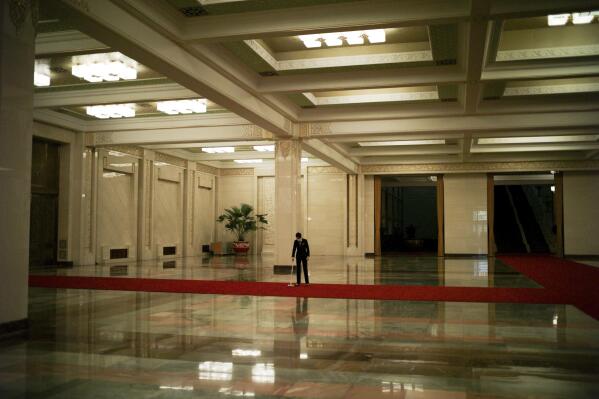
A man cleans a carpet inside the Great Hall of the People prior to the arrival of French President Emmanuel Macron, in Beijing, China, Thursday, April 6, 2023. (AP Photo/Thibault Camus)
A man smokes a cigarette next to the Houhai lake in Beijing, China, Wednesday, April 5, 2023. (AP Photo/Thibault Camus)
A man stands behind a curtain inside the Great Hall of the People prior to the arrival of French President Emmanuel Macron, in Beijing, China, Thursday, April 6, 2023. (AP Photo/Thibault Camus)
A journalist takes a snapshot of the portrait of late Chinese leader Mao Zedong on Tiananmen Gate, in Beijing, China, Thursday, April 6, 2023. (AP Photo/Thibault Camus)
A guard salutes outside the Great Hall of the People prior to the arrival of French President Emmanuel Macron, in Beijing, China, Thursday, April 6, 2023. (AP Photo/Thibault Camus)
Chinese press officers walk on the courtyard of the Great Hall of the People prior to the arrival of French President Emmanuel Macron, in Beijing, China, Thursday, April 6, 2023. (AP Photo/Thibault Camus)
Men stand next to a meeting room where French President Emmanuel Macron and Zhao Leji attend a meeting, in the Great Hall of the People, in Beijing, China, Thursday, April 6, 2023. (AP Photo/Thibault Camus)
Chinese honor guard members and media get ready prior to the start of the welcome ceremony of France’s President Emmanuel Macron at the Great Hall of the People in Beijing, China, Thursday, April 6, 2023. (AP Photo/Thibault Camus)
Chinese honor guard members get ready prior to the start of the welcome ceremony of France’s President Emmanuel Macron at the Great Hall of the People in Beijing, China, Thursday, April 6, 2023. (AP Photo/Thibault Camus)
People visit the Beijing Confucius Temple in Beijing, China, Wednesday, April 5, 2023. (AP Photo/Thibault Camus)
A view of the garden of the Song Yuan presidential residence in Guangzhou, China, Friday, April 7, 2023. (AP Photo/Thibault Camus)
French media leave after the tea ceremony between Chinese President Xi Jinping and France’s President Emmanuel Macron, at the Song Yuan presidential residence in Guangzhou, China, Friday, April 7, 2023. (AP Photo/Thibault Camus)
A journalist listens to the speech of French President Emmanuel Macron during the inauguration of the Festival Croisements at the Red Brick Museum, in Beijing, China, Wednesday, April 5, 2023. (AP Photo/Thibault Camus)
Members of the fanfare leave after the welcome ceremony of France’s President Emmanuel Macron at the Great Hall of the People in Beijing, China, Thursday, April 6, 2023. (AP Photo/Thibault Camus)
Chinese donor guard members walk past prior to the start of the welcome ceremony of France’s President Emmanuel Macron at the Great Hall of the People in Beijing, China, Thursday, April 6, 2023. (AP Photo/Thibault Camus)
Men wait for a Covid test, left, as others sit in the Great Hall of the People in Beijing, China, Thursday, April 6, 2023. (AP Photo/Thibault Camus)
- Copy Link copied
A week ago, I traveled with a group of journalists assigned to cover French President Emmanuel Macron’s trip to China. It was my first trip to the country, and I was excited.
I have covered many state trips in my career as a photojournalist with The Associated Press. Often, photographers are led from one highly choreographed event to the other. It is a challenge to break from the script laid out by press officers, especially in a country like China, where both guests and media are subject to a strict protocol.
Here, there are no unforeseen events or delays, which the French president is especially prone to. I was thrown from one meeting to another, from one handshake to another. In the middle of all that, I wanted to catch the moments surrounding the orchestrated diplomacy — to show the other side of the scene.
There were security guards in dark green uniforms marching on pavements, white pandemic masks hiding their faces. Young students excitedly pulling up smart phones to snap photos of French media. A lone woman cleaning the red carpet at the Great Hall of the People in Beijing before Macron’s arrival and his meeting with the Chinese prime minister. Security guards loitered in hallways.
I wanted to linger on these low intensity moments that punctuated the sudden rush to get to the next place where the next photo would be taken. To get out of the news bubble, to capture less spectacular subjects, as if they were souvenir photos. To show what the public does not usually see: the other side of the story.
- Culture, Language & Education
- Higher Education, Research & Innovation
- Consulate in Edinburgh
- Consulate in London
French Embassy in London
Home > Newsroom > Latest News > President Macron pays State visit to China
- Réduire la police du site
- Agrandir la police du site
President Macron pays State visit to China
China – state visit to china: first day in beijing – communiqué issued by the presidency of the republic, china – speech by m. emmanuel macron, president of the republic, to the french community in china, china – joint statement by the french republic and the people’s republic of china, china – statements by m. emmanuel macron, president of the republic, to students at sun yat-sen university in guangdong, china – taiwan – replies by m. emmanuel macron, president of the republic, to questions at his joint press conference with mr mark rutte, prime minister of the netherlands (excerpts).
Paris, 5 April 2023
From 5 to 8 April 2023, the French President is visiting China. He spent the first day of his State visit in Beijing.
President Emmanuel Macron was keen to begin by speaking to the French community. He paid tribute firstly to medical and healthcare staff, as well as French school managers and teachers, for their sense of duty during the pandemic.
During his speech, the Head of State then set out the goals of his visit:
To involve China in shared responsibility for peace and stability;
To strengthen the Franco-Chinese trade relationship;
To recommit to a common framework of action on major international issues such as the fight against climate change and the protection of biodiversity.
Finally, President Macron recalled the importance of revitalizing cultural links between France and China in 2023 in order to prepare for 2024, which will be the year of the Olympic and Paralympic Games, the year of Franco-Chinese cultural tourism and the 60th anniversary year of diplomatic relations between France and China.
Watch his speech to the French community in Beijing:
President Macron subsequently attended the opening of the 17th Croisements Festival at Beijing’s Red Brick Art Museum.
This Franco-Chinese festival remains the biggest foreign festival in China, with 15 million visitors since its creation. For its inauguration, among other things President Macron presented the programme for this impressive event. He went on to announce three new programmes to be launched in 2023 to support the resumption of creative exchanges between France and China:
• A residency exchange programme for French artists in China and Chinese artists in France
• A programme to support contemporary dance;
• Investment in arts professions and the exchange of know-how between France and China.
Finally, President Macron set out the various forms of cooperation which give the cultural link between China and France its strength: literature, cinema, music and digital creation.
Beijing, 5 April 2023
Members of Parliament,
Ambassador, thank you for your hospitality,
Representatives of French nationals abroad,
Ladies and gentlemen,
Compatriots,
Thank you, Prime Minister, for accompanying us, although one might say we are accompanying you, if you will.
I am very pleased to see you again three years, just over three years after the previous visit right here, in November 2019. Several people here were already with me then.
And I know these three years were particularly difficult. I would like to start with a few words for you, for all the teams, and to express France’s recognition and support. I know the dedication our Embassy showed, like our Consulates General, the local coordinators and our contacts in associations and in educational and medical matters – and last but not least, our local elected representatives.
I realize that expatriation, in these difficult times of the pandemic, led to difficulties and sometimes even suffering for you and your families. So allow me to particularly commend the devotion of the medical and care teams, here at the Embassy, and the sense of duty shown by the management of French schools and by teachers, and the spirit of resilience of families and of course pupils that got them through this crisis.
The whole French community in China has shown remarkable courage. In Shanghai, our citizens went through a particularly strict and long period of confinement, and especially last spring, but it was also true in Wuhan, Chengcheng, Guangzhou, Hong Kong, Chengdu, Shenyang and many other places. The solidarity that you showed during this period has left us full of admiration, and I am keen to thank all those who went through this particularly difficult period while demonstrating the sense of responsibility, making so many sacrifices to remain.
A little over 22,000 of you are now exploring this relationship and “the other pole of the human experiment”, as Simon Leys put it, split equally between continental China and Hong Kong. The community is not as large as it was before the pandemic, but it is tight-knit and continues, I know, to support many projects. I am counting on you to support all those who, in the coming months and years, will come to continue building this relationship.
These are, as we know, challenging times. But we have undeniable strengths here and the will to give new impetus to a strategic and comprehensive partnership with China. I wanted to start with these words for you because I know how difficult these years have been, and I would not have the opportunity, if you will, to talk about the future if you had not held on through this period. The strength of this relationship is the men and women who forge it, including students, artists, scientists, researchers, businesspeople, entrepreneurs and politicians. And it will be up to us to write the next chapters of this bilateral relationship in particularly difficult times.
I also wanted to touch on this visit and on our goals. I wish to seize the opportunity of this first speech to share, if you will, the major thrusts of our goals. We are increasingly hearing major concerns about the future of relations between the West and China, and conclusions, if you will, on a sort of unstoppable chain of growing tensions. If we were only to read the comments where, ultimately, if you will, everything has already been said, there would be no choice: the decoupling would be underway, and the only question would be its pace and its intensity. There would be nothing to do but watch it happen. I do not believe, and I do not want to believe, in that scenario.
It is of course absolutely obvious that we do not share China’s political system, and there is indeed a rivalry, that we are not ashamed of, with the European Union. But we also know that there are major international subjects on which we need to engage, and we have rather particular human relations. Ultimately, this singular page that France has begun to write with China started centuries ago, but it has been reaffirmed and the history of the last decades leaves us a duty.
This page of more contemporary history, begun in 1964 with General de Gaulle, on the basis that the international situation had become more unstable, must not, if you will, be rejected. And it is not, to cite the latter, when the weight of evidence and reason has grown, that we must pull back, turn inwards and accept, if you will, bloc geopolitics. I can already hear the comments. This does not mean that there is a form of equidistance, or a system of equivalence, between the blocs, but this is simply a matter of clear-sightedness where we must look at what we have to do in this conversation, if you will, with the rest of the world.
China holds a special place for us, thanks to our intellectual, artistic, scientific, industrial and geopolitical history, and thanks also to what China represents today. China now produces as much wealth each year as all the European Union’s Member States put together. It is the leading trading partner of more than 60 countries worldwide, the leading consumer of coal, the leading creditor of the most vulnerable countries, and one of the leading military powers.
This accumulation of leading roles has clearly transformed this country. And many of you, who have a historic presence, have seen it change resolutely, including in its self-perception, over the last 15 or 20 years.
China’s leaders are now fully at ease with this new power balance, and their relationship with the economy, a form of hegemony, and its international balances, and with power, is no longer the same. But it is precisely in this period that this contemporary dialogue that we have forged, precisely on the basis of centuries of history, is meaningful.
Since the beginning of my first term and my visits in 2018 and 2019, I noted this engagement, without the slightest naivety and with much humility, and the role our country can play. That of fostering this singular relationship, of being a voice that unites Europe, as we have done since 2019 when, during the Chinese President’s state visit, we invited Federal Chancellor Merkel and President Juncker to the table, with the aim, if you will, of consolidating China-Europe dialogue and defending universal values, that are the very core of our identity, in a respectful dialogue.
In coming to Beijing with the President of the European Commission, Ursula von der Leyen, I aim to highlight the coherence of this approach and set it, if you will, in this course we have chosen.
So, what are the parameters of this relationship, and what can we expect? I will start with the political and strategic aspect, that, of course, of the war in Ukraine and what we can hope to achieve with China. Russia’s war in Ukraine has deeply affected the international order that we have known since 1945, and this war, that I have several times described as imperialist and colonial, has trampled many of the principles of the Charter of the United Nations that the permanent Security Council members that we are must defend resolutely.
And so China, on the strength precisely of its close relationship with Russia, which was reaffirmed in recent days, can play a major role. The challenge we face is, if you will, not to push blocs against one another and, if you will, not to write history in advance, considering that this war is a replay of strategic movements that have already been written. I believe the contrary. China has shouldered responsibility when it comes to the nuclear issue. We, too, can commit, and that will also be crucial in what is happening today, of course, in the context of Russia’s war of aggression in Ukraine, and also in the choices that have been made concerning Belarus and civil nuclear power.
China has reaffirmed its commitment to the Charter of the United Nations, of which the territorial integrity and sovereignty of nations are part. And I believe that defending them means working together and seeking to find a path to peace. China, precisely, has proposed a peace plan, which we commended. Do we agree with everything in it? No. But it is worthy of interest and it shows the will to get involved in resolving the conflict. And so, while it is not a peace plan, it is a will to shoulder responsibility and seek to build a path to peace and, I hope, to take part in initiatives of use to the Ukrainian people.
I think this dialogue with China is essential, because we, the Europeans of the European Union, would be wrong to leave a monopoly on dialogue with China to other continental Europeans, meaning the Russians, and to consider that it would be the only one, if you will, to give its reading of events and how they play out, and propose strategic options. It is important to speak directly to China about this conflict, this Russian war of aggression, and what is at stake, the consequences – consequences for our Europe, and consequences for the Middle East, the African continent, and many other regions. And we must seek to engage them in a strategic relationship that is perhaps more complex than that some think is already written.
That is what I will discuss with the President, tomorrow and the day after. We need to seek to build this shared responsibility, if you will, for global peace and stability, and engage with China, and thus, through this conflict and also regarding the issues of Iran and North Korea. I believe that is our responsibility.
Then, and for me this is the second purpose of this visit, we will also need to discuss the parameters of our commercial relationship. I would like to thank the economic delegation here today. We will hold the council that we created in 2018, the France-China Business Council, which is extremely important and will meet for the first time since the pandemic. Several major contracts will be signed by several of you in all the fields represented here, which you represent on the ground, concerning aviation, major transport companies, tech, decarbonized energy, agribusiness, luxury goods, cosmetics, automobile production and many other sectors, in which we have a presence thanks to our major groups, our SMEs, our intermediate-sized enterprises and our start-ups. And our 2,000 companies, many of which have been here for a long time, are a strength that we want to further strengthen.
We also have agendas for agribusiness, which we have been working on since 2018, as well as other fields that we will consolidate. And I would like to thank the representatives here of this dynamic, innovative and proactive community: the France-China Chamber of Commerce and Industry, the Foreign Trade Advisers, the French Tech communities and the France-China Committee, who play a very important structuring role. All of you help build this relationship and enable us to move forward.
However, clear-sighted reflection has shown me that the relationship is currently not completely balanced. And that when we talk of trade relations we must try to re-engage efforts so that the market continues to open up and that when we concede certain openings, they should be accompanied by symmetrical or at least comparable gestures. And I believe that in this strategic context of tension that I mentioned, when I read about the increasing desire to decouple the major economic blocks, the path we have promoted in recent years – with, I believe, a great deal of friendship, frankness and a spirit of responsibility – is a path that I would not describe as being middle-of-the-road, but realistic and ambitious that should be followed. We have never been naive about China, its government or its companies.
Five years ago, when I arrived, I explained that certain telecommunications components were a subject of national security. And China could actually understand that quite well as it was doing the same thing when it came to its economy. But when you say it respectfully, first one-on-one before proclaiming it, when you do not have public televised debates confronting one another about it and are respectful, I believe that you are understood. And we have been one of the most rigorous countries, who acted the earliest, regarding telecommunications, while obtaining openings in the agrifood sector. I believe that it is this path we must continue to take: one of ambitious standards. Therefore, we must not be naive.
That is what our European Union – and I welcome this, taking this approach of European sovereignty that I defended five years ago – has built, trade defence instruments that are needed for our credibility. But it must also proactively engage in order to continue to have a commercial relationship with China. Therefore, we have to de-risk our economies, if you will, without ever being completely dependent. And as a matter of fact, this is what China wants for itself, when it looks at Europe or the United States. But, we must not decouple and separate ourselves with an approach that would portray over the long term that we no longer intend to do anything together, which I believe would be a disastrous error.
Credibility, defence of our interests, but engagement in major common economic projects, in the opening of the agrifood sector as well as consolidation of all major markets you defend and where considerable market share for your groups or your companies are represented here in China, with greater reciprocity of our trade. I believe this approach is demanding, ambitious and clear-sighted, and I want to defend it here today. However, there is a path forward because, as we can see, we can also get stuck in a bloc-to-bloc approach which would mean that we, Europeans – if we want this path to be possible – must move much further down the path to our strategic autonomy, and therefore have a Europe that must accept and stand by the fact that when it makes choices, it does not depend on the extra-territoriality of choices made by others and it can take its own path.
The third objective is to re-engage in a common framework for action on the major international issues. In 2019, we engaged and – I read many sceptical comments at the time about the issue of biodiversity with China – preparing the coming COPs. What we consolidated in 2019 has produced effects: the UN Biodiversity Conference (COP), a few months ago in Montreal, and negotiations on the high seas, called BBNJ, where we achieved positive outcomes from this joint diplomatic work we did. And I think that it is possible to work together and that it is even a requirement for our international action to be credible. Because when you are speaking to such a powerful economy, which is, as I have said, the leading consumer of coal, which has said that it would reach its peak in 2030, and which, I believe, can do much better, and which thereby determines the global emissions of the years ahead, when you are speaking to a major power in terms of biodiversity, when you are speaking to a major power in terms of artificial intelligence or quantum or digital technology, the regulation of these common goods is determined by partnership-based work with China. And therefore, from tackling climate change and its effects and to biodiversity protection, we have achieved positive outcomes.
I want us to continue to work on them. France will hold a Conference on Oceans in Nice in 2025 and I hope to fully involve China. In these food security efforts, we must also work together. And in June, we will hold a very important summit to rebuild the new global financial pact and fairly define the financial terms of international solidarity, whether it concerns debt issue or mobilization of the World Bank and IMF, to address both inequalities and consequences of climate change. We need China’s involvement on this issue. And that is what I will try to do here – build – and what I will try to convince Chinese leaders to do.
As you see, the relationship is not simply bilateral. It is also being built at EU level, as I was saying. That is a crucial reason the President of the Commission is coming. But the relationship is also built on these major international issues.
And we will have an opportunity during this visit, right after this meeting, together with artists and our leaders of cultural institutes, to have just as an important meeting regarding culture; and then the day after tomorrow in Guangzhou, which is an important economic and cultural hub of China, to build this outreach policy, this cultural policy and share experiences. I believe that it is a key component of our relationship, the strength of people-to-people ties. Many of you perpetuate them and are inspired by this mutual fascination – and I believe this is still true – between China and France.
The relationship has undergone many transformations, but these people-to-people ties that feed off culture, design, science and trade are enduring ties between two longstanding countries that appreciate audacity. A constant connection with universality and for which there is dialogue, if you will, that should not be broken off – quite the opposite. And therefore, I will be pleased later to continue down this path, of these shared experiences, and in Guangzhou, to pursue this work and this deeply personal relationship between the Chinese and French people.
These shared experiences inspired the name of the festival that I will have the pleasure of inaugurating this evening and that for 20 years has celebrated the vitality of French culture in China and the same inspiration of our artists. I hope that this path continues to be followed. And China’s recent decisions to allow Chinese people to visit France again and to resume the issuance of visas to tourists is absolutely essential. Our cultural institutions are aware of this, our gastronomy is waiting for this and our artists want this.
It is especially essential as in 2023 we have to develop the vitality of these ties, because we are preparing for 2024 with great force. For 2024 is the year France is hosting the Olympic and Paralympic Games. It will also be the year of French-Chinese cultural tourism and the year of the 60th anniversary of our diplomatic relations. 2024 will be an extremely important time in this relationship and I hope that our Chinese friends will increasingly wish to visit and experience our country, our landscapes, our culture, and our gastronomy that are waiting for them.
And at the start of this visit and with the pleasure I have to see you again, these were the words I wished to share with you. With thanks and encouragement, and especially the perspective provided by this visit – this first visit following the pandemic in China – and share with you my wish, the French government’s wish to continue very determinedly, at bilateral level, but also with our Europe and with regard to the major international issues that we share, this crucial dialogue with China. You are the ones who keep this dialogue going, through your commitment, your work and your action. And for this we will be eternally thankful.
Long the French Republic and long live France!./.
7 April 2023
At the invitation of Mr Xi Jinping, President of the People’s Republic of China, Mr Emmanuel Macron, President of the French Republic, made a state visit to the People’s Republic of China from 5 to 7 April 2023. As the 60th anniversary of the diplomatic relations between France and China approaches, the two Presidents highlighted the solid foundations of the relations between the two countries and the friendship between the two peoples. They held in-depth discussions on the bilateral relationship, the EU-China relationship, and major regional and international questions, and decided to establish new horizons for Franco-Chinese cooperation, as well as seeking new impetus for relations between the European Union and China, in line with the joint statements adopted on 9 January 2018, 25 March 2019 and 6 November 2019.
I. Strengthening political dialogue and promoting mutual political confidence
1. France and China will continue annual meetings between the Presidents.
2. France and China highlight the importance of high-level contacts, their strategic dialogue, their high-level economic and financial dialogue and their high-level dialogue on people-to-people exchanges in fostering the development of their bilateral cooperation, and agree to hold another session of the said dialogues by the end of the year.
3. France and China reaffirm their will to continue the sustained development of their close and robust comprehensive strategic partnership, on the basis of mutual respect for their sovereignty, their territorial integrity and their major interests.
4. France and China agree to deepen discussions on strategic issues and in particular to deepen dialogue between the Southern Theatre Command of the Chinese People’s Liberation Army and the Command of French Forces in the Asia-Pacific Zone (ALPACI), in order to enhance their mutual understanding of regional and international security issues.
5. In this 20th anniversary year of the China-EU comprehensive strategic partnership, China reaffirms its commitment to developing EU-China relations, encourages high-level discussions to foster convergence of views on strategic issues, to increase people-to-people exchanges, to collectively address global issues and to promote balanced and pro-active economic cooperation. As a European Union Member State, France shares these focuses and will contribute.
6. France reaffirms its commitment to the One China policy.
II. Together promoting global security and stability
7. As permanent members of the Security Council, France and China work together to seek constructive solutions based on international law to address the challenges and threats to international security and stability. They consider that divergences and disputes between States should be settled peacefully through dialogue and consultations. In a multi-polar world, they seek to strengthen the international multilateral system under the auspices of the United Nations.
8. France and China reiterate their endorsement of the P5 Joint Statement of the Leaders of the Five Nuclear-Weapon States (China, France, Russia, the United Kingdom and the United States) on Preventing Nuclear War and Avoiding Arms Races of 3 January 2022. As it reiterates, “a nuclear war cannot be won and must never be fought”. The two countries call for any party to refrain from any action that could worsen the risks of tensions.
9. The two countries intend to strengthen coordination and cooperation in order to together preserve the authority and effectiveness of the arms control and non-proliferation regime and to advance the international arms control process. France and China reaffirm their commitment to balanced promotion of the three pillars of the Treaty on the Non-Proliferation of Nuclear Weapons (NPT) that are nuclear disarmament, nuclear non-proliferation and the peaceful use of nuclear energy, and to constantly strengthen the universality, authority and effectiveness of the NPT.
10. The two countries support any effort to foster a restoration of peace in Ukraine on the basis of international law and the goals and principles of the Charter of the United Nations.
11. The two countries oppose armed attacks against nuclear power plants and other peaceful nuclear facilities, and support the efforts of the International Atomic Energy Agency (IAEA) in its efforts to play a constructive role in promoting the safety and security of peaceful nuclear facilities, including to ensure the safety and security of the Zaporizhzhia nuclear power plant.
12. The two countries underline the importance of scrupulous compliance with international humanitarian law by all the parties to the conflict. In particular, they call for protection of women and children, victims of the conflict, for increased humanitarian assistance to conflict areas, and for safe, swift and unobstructed humanitarian access in accordance with international commitments.
13. The two countries will continue their consultations within the France-China strategic dialogue.
14. The conclusion of the Joint Comprehensive Plan of Action in 2015 was a major achievement for multilateral diplomacy. France and China reiterate their commitment to promoting a political and diplomatic settlement on the Iran nuclear issue. They reiterate their commitment to preserving the international nuclear non-proliferation regime and the authority and effectiveness of Security Council resolutions. They reiterate their support to the IAEA in this regard.
15. France and China will continue close consultations concerning the Korean Peninsula.
16. The two countries agree to continue their discussions via the France-China dialogue on cyber issues.
III. Promoting economic exchanges
17. France and China commit to provide a level playing field for companies, particularly in the fields of cosmetics, agricultural and agrifood products, air traffic management, finance (banks, insurance, asset managers), health (medical equipment, vaccines), and energy, investment, and sustainable development. To do this, the two countries are working to provide a good environment for business cooperation, to improve business access to each other’s markets, to improve the business climate, and to ensure compliance with intellectual property rights of all companies of the two countries. In the field of the digital economy, including with regard to 5G, France commits to continue the fair and non-discriminatory processing of licence applications submitted by Chinese companies on the basis of laws and regulations, including with regard to the two countries’ national security.
18. France and China intend to continue to enhance their pragmatic cooperation in all fields of the service sector, and support economic and commercial exchanges between the two countries’ institutions and companies on the basis of mutual benefit, with a view to promoting the development of trade in services. France is ready to accept the invitation to participate in the 2024 China International Fair for Trade in Services (CIFTIS) as a guest country of honour.
19. France and China wish to intensify their partnership in the agricultural, agrifood, veterinary and phytosanitary fields. They welcome the securing of access to the market for pork products, the opening of the market for baby kiwi and for dairy proteins in animal feed, as well as the approval issued to 15 pork exporters. The authorities of the two countries will respond as swiftly as possible to future applications for approval of companies exporting agricultural and agrifood products, in particular meat and fish products, to applications for registration of infant milk formulas, which meet the requirement laid down by their food safety as well as to market opening requests made by their respective authorities. The two countries will continue their exchanges and cooperation in the suckler cows and viticulture sectors, as well as on geographical indications (GIs), in particular for the registration of GIs for Burgundy wines. France will support the application that China will submit to join the International Organisation of Vine and Wine (OIV) as swiftly as possible, as well as the organization by China of an international conference on the wine sector.
20. France and China welcome the conclusion of a General Terms Agreement confirming the purchase by Chinese companies of 160 Airbus aircraft. They will study in due course the needs of Chinese airlines, especially in terms of cargo and long-haul aircraft, according to the recovery and development of the Chinese transport market and air fleet. The two countries welcome the strengthening of cooperation between the European Aviation Safety Agency (EASA) and the Civil Aviation Administration of China (CAAC), and will continue to accelerate the certification process on the basis of mutually recognized international safety standards, particularly with regard to the H175, Falcon 8X and Y12F programmes. They welcome the conclusion of an agreement between the two countries’ companies of on sustainable aviation fuels. They are also continuing ongoing industrial cooperation, in particular the project for the new Airbus assembly line in Tianjin.
21. France and China support the resumption at the earliest opportunity of air connectivity to its pre-pandemic level, in a coordinated manner between civil aviation authorities and with a view to resuming implementation of the Agreement between the Government of the People’s Republic of China and the Government of the French Republic relating to air transport signed on 1 June 1966 and the relevant arrangements on air freedoms. Airlines of the two countries should have fair and equal opportunities to operate flights between the two countries. They support the deepening of people-to-people and economic ties, including the facilitation of the issuance of visas for the private sector and the business community.
22. They welcome cooperation between the two countries’ space institutions, regarding the Chang’e 6 lunar probe and joint studies of extraterrestrial samples.
23. In their common desire for a transition to a decarbonized energy system, France and China are developing pragmatic cooperation in the field of civilian nuclear energy under the Agreement for Cooperation Concerning Peaceful Uses of Nuclear Energy between the two governments. The two countries are committed to continuing their nuclear cooperation on cutting-edge research and development topics, in particular on the basis of the agreement between the China Atomic Energy Authority (CAEA) and the French Alternative Energies and Atomic Energy Commission (CEA). The two countries support the study by the two countries’ companies of the possibility of enhancing their industrial and technological cooperation, in particular on the reprocessing of nuclear waste.
24. France and China welcome the results obtained by the 2015 intergovernmental agreement on partnerships in third markets. They are working on monitoring and implementing cooperation projects in third markets that have already been identified. The two governments encourage companies, financial institutions and other players to explore new structural economic cooperation projects in third markets, on the basis of applicable high international standards.
IV. Boosting people-to-people and cultural exchanges
25. Keen to promote and protect the diversity of cultural expressions in the world, France and China support the deepening of their cooperation in the creation and showcasing of cultural works and will promote a dynamic resumption of exchanges and cooperation in the cultural and tourist fields. The two countries welcome the conclusion of a declaration of intent relating to cooperation in the field of culture between the two Ministries of Culture.
26. They will co-organize the Franco-Chinese Year of Cultural Tourism in 2024 and support the organization in France and China of high quality events, in particular between the Palace of Versailles and the Forbidden City as well as between the Pompidou Centre and the West Bund Museum. They commit to facilitate the circulation of the exhibitions in compliance with the two countries’ laws, in particular with regard to customs and logistical aspects, and will strive to ensure the integrity and return of the works exhibited within the framework of the supported exhibitions.
27. They reaffirm their desire to strengthen cooperation in cultural and creative industries, and their potential for reaching the widest audience possible, in particular in the sectors of literature, cinema, television documentaries, publishing (including video games), music, architecture and digital media through co-productions, copyright partnerships, competitions and artist exchanges.
28. France and China commit to intensify their bilateral cooperation in the protection, restoration and promotion of cultural heritage. The two countries welcome the conclusion of a roadmap on heritage cooperation relating in particular to Chinese experts working alongside French teams onsite to restore Notre-Dame Cathedral in Paris, cooperation on the protection, restoration and study of the Terracotta Army, cooperation projects around the Gongshutang Temple and the Maoling Mausoleum and the promotion of the twinning of French and Chinese World Heritage sites. The two countries will continue joint efforts to prevent and fight theft, clandestine excavations, and the illicit import and export of cultural property. They reaffirm their full support for the International Alliance for the Protection of Heritage in Conflict Areas (ALIPH).
29. France and China reaffirm the importance they attach to cooperation on teaching each other’s languages, through which friendship and mutual understanding are forged. They will work on revitalizing the linguistic cooperation agreement between the two governments signed in June 2015, encourage the development of the teaching of the two languages in the two countries’ schools and the multiplication of bilingual courses, and promote exchanges and training of language teachers.
30. France and China reiterate their commitment to strengthening cooperation in higher education and vocational training. They will encourage the development of partnerships between higher education institutions, such as Franco-Chinese institutes, and together promote the mutual resumption of student and teacher mobility. They will also facilitate exchanges between schools. To this end, the two countries will establish a fast-track procedure for obtaining visas for these groups. The two countries will organize a new session of the Joint Franco-Chinese Commission on Education at the earliest opportunity.
31. The two Presidents agree that the next Joint Franco-Chinese Commission on Science and Technology should be held at the earliest opportunity to define the major guidelines for both bilateral scientific cooperation and the Joint Franco-Chinese Centre for Carbon Neutrality dedicated to promoting scientific and technological cooperation in the field of carbon neutrality. France and China wish to promote research exchanges, in particular through the Franco-Chinese Scientific Partnership Programme (the Hubert Curien – Cai Yuanpei Partnership). The two countries also intend to continue the implementation of the France-China Young Talents Programme in order to strengthen exchanges between young researchers from the two countries and promote cooperation in priority areas and the development of joint research activities.
32. Ahead of the Paris 2024 Olympic and Paralympic Games, the two Presidents wish to make sport an important component of the bilateral relationship, particularly in terms of exchanges of young athletes, development of sports infrastructure and sharing expertise in relation to the sports industry.
V. A joint response to global challenges
33. Against the backdrop of food crises which affected 323 million people in 2022 according to the United Nations, the two countries are committed to maintaining market stability, avoiding unjustified export restrictions on inputs as well as agricultural products, and optimizing global food supply chains, starting with facilitating the export of cereals and fertilizers. The two countries are working to achieve these goals, including through the Food and Agriculture Resilience Mission (FARM) initiative and the Chinese initiative for global food security.
34. France and China agree on the importance of increasing support for the countries hardest hit by the food crisis, including their African partners, to build resilient and sustainable food systems. To that end, they intend to promote international cooperation for local production and against food loss and wastage. With this in mind, they are providing joint support to the competent organizations to address the issue of food security, including the United Nations Food and Agriculture Organization (FAO), the International Fund for Agricultural Development (IFAD), the World Food Programme (WFP), financial institutions and multilateral and bilateral donors.
35. France and China highlight their support for the rules-based, WTO-centred multilateral trading system, undertake to build a free, open, transparent, inclusive and non-discriminatory trading environment, support the necessary WTO reform and support a positive outcome for the 13th WTO Ministerial Conference.
36. France and China intend to cooperate to resolve the difficulties in accessing financing in developing and emerging economies, and to encourage them to speed up their energy and climate transition while supporting sustainable development. China will take part in the Summit for a New Global Financing Pact in Paris in June 2023. France will attend the third “Belt and Road” Forum for International Cooperation.
37. The two countries agree to strengthen cooperation as part of the G20 so that the G20 plays its role as a major forum for global economic cooperation and, in line with its commitments made by the leaders at the Bali Summit, works to further the reform of the international monetary and financial system.
38. Against the backdrop of more vulnerable developing countries, France and China support the implementation of the Common Framework for Debt Treatments adopted by the G20 and the Paris Club which they joined in November 2020. The two countries reiterate their commitment to implementing the Common Framework in a timely, predictable, ordered, and coordinated manner, as well as their support for the debt agenda adopted at the meeting of G20 Finance Ministers and Central Bank Governors in February 2023.
39. They appreciated that the G20 Summit in Bali welcomed the voluntary channelling of special drawing rights (SDR) and they call on the G20 Member States and volunteer States to increase their action, with a 30% increase in SDR made available for G20 countries, in order to quickly reach the $100 billion goal adopted at the G20 Rome Summit.
40. The climate, biodiversity and the fight against land degradation are among the priorities shared by France and China. The two countries undertake to maintain a high level of ambition, following on from the Beijing Call launched in November 2019 and in line with the United Nations Framework Convention on Climate Change (UNFCCC) and its Paris Agreement, as well as the Kunming-Montreal Global Biodiversity Framework (hereinafter referred to as the “Kunming-Montreal Framework”), adopted during the second part of the Convention on Biological Diversity (COP15) and which both parties welcome. China, which chairs the COP15 for the next two years, intends to work actively with France to fully and effectively implement the Kunming-Montreal Framework. France and China welcome the active contribution of the Kunming Fund and the facility which will be created to fund biodiversity under the Global Environment Facility. They welcome the work set out at the One Forest Summit in Libreville.
41. By COP16, France and China are committed to set out their revised national strategies and action plans, which will be aligned with the global biodiversity framework. China will positively consider joining the High Ambition Coalition for Nature and People. The two countries are contributing to the goal of reducing subsidies that harm biodiversity by $500 billion per year.
42. France and China reaffirm their respective commitments to climate neutrality and carbon neutrality. France is committed to achieving climate neutrality by 2050. China is committed to reaching its CO2 emissions peak by 2030 and to achieving carbon neutrality by 2060. The two countries will adopt policies and measures to implement their goals as regards nationally-determined contributions aligned with those of the Paris Agreement.
43. They hugely appreciate the progress on climate change made at COP27 and are committed to maintaining close discussions and coordination in the run-up to COP28, so that the first global stocktake of the Paris Agreement will be a success and encouraging progress can be seen on issues like mitigation, adaptation, loss and damage, as well as implementation methods.
44. France and China support the promotion and development of financing contributing to the ecological transition. They are encouraging their financial sectors (including banks, insurers, managers and asset owners) to align their activities with the goals of mitigation and adaptation to climate change, as well as those of preserving biodiversity, developing the circular economy, managing, controlling and reducing pollution, and blue finance. France and China are also encouraging discussion between agencies and development banks, central banks, regulators and financial authorities in the area of green and sustainable finance, with the aim of sharing their experiences and promoting the establishment and improvement of standards, including in the area of standardizing extra-financial information. They are committed to supporting the development of sustainable capital markets.
45. France and China are aware that the building sector accounts for a large share of their greenhouse gas emissions and are actively considering joining the Buildings Breakthrough initiative. The two countries are stepping up their cooperation to promote reduced energy consumption and decarbonization of buildings and to encourage sustainable urban development.
46. France and China are taking action to protect the Ocean. The two countries welcome the finalization by the Intergovernmental Conference on Marine Biodiversity of Areas Beyond National Jurisdiction of a text aimed at ensuring the conservation and sustainable use of marine biodiversity in areas beyond national jurisdiction and continue to step up discussions and coordination as part of the follow-up process to that text. The two Heads of State reaffirmed that their countries will work to promote the conservation of marine living resources in the Antarctic in accordance with the Convention for the Conservation of Antarctic Marine Living Resources, and are continuing discussions on creating marine protected areas in the Antarctic. France and China are working within the UN Decade for Ocean Sciences for sustainable development and have created national committees, in 2021 and 2022 respectively, in order to highlight the importance of knowledge in order to better protect the oceans. They recognize the importance of combatting illegal, unreported and unregulated fishing.
47. France and China are working to bring about a successful UN Ocean Conference 2025, to be co-hosted by France and Costa Rica. China will examine the roadmap proposed by France, linking their respective COP15 Kunming presidencies on biodiversity and the third UN Ocean Conference, to be held in Nice in 2025.
48. France and China are fighting pollution generated by plastics (including microplastics), are supporting and participating in the negotiating work of the Intergovernmental Committee mandated by resolutions 5/14 adopted during the resumed fifth session of the United Nations Environment Assembly (UNEA-5.2), and are working to adopt a legally-binding international instrument.
49. France and China are committed to sustainably protecting and managing forest ecosystems, supporting scientific research on more sustainable value chains and combatting illegal logging and its associated trade. They intend to further cooperation on the conservation of nature as well as the protection, restoration and sustainable use of steppe zones. Within this framework, France and China welcome the active cooperation between the French Biodiversity Agency (OFB) and China’s National Forestry and Grassland Administration (NFGA).
50. France and China will work together towards a fairer energy transition in developing countries through fair energy transition partnerships and other tools.
51. France and China highlight the importance for the development of each country of promoting and protecting human rights and fundamental freedoms in line with the goals and principles of the Charter of the United Nations./.
Guangdong, 7 April 2023
(Check against delivery)
Hello everyone. Dàjiā hǎo .
I’m going to try and share a few words with you, and above all answer your questions, because this is more an exchange than a speech. But I am indeed very pleased to be at your university today.
Thanks very much, Mr President, for your words just now. Guangdong has a very special history, including a very special history with France. When we look back to this past, the first French ship, the Amphitrite, which set sail for Guangdong from the port of La Rochelle, didn’t have any soldiers or traders or conquerors on board: it primarily had mathematicians. And that’s slightly akin to the metaphor of the debate we’re having today; [we’re] convinced that it’s through knowledge and science that friendship can be forged. And we’re convinced that it’s also by this means that it can be maintained. Indeed, for this path, this somewhat unique path, knowledge and mutual understanding have played a unique role.
So after three years of pandemic, I’m pleased to be back in China. I had the opportunity to speak to your President at length in Beijing yesterday. I’ll be seeing him again shortly, just after you. But resuming the conversation, in a way, and dialogue, also means trying to provide a few signposts for the future about what our relationship, what China and France together can forge, can do for ourselves, our peoples and the world. And on the strength of what’s just been said, I wanted simply to share three strong beliefs.
The first is that we have a great deal to do together to successfully tackle one of the challenges of our age and our generations, yours and mine – that of the ecological transition – and take up the challenges of climate change, the disruption that ensues and the protection of biodiversity. Our countries have worked together a great deal in recent years to push forward international legislation, treaties. But we – China and France, China and Europe – now have a lot to do in practice to make a success of transforming our economies.
So in this regard, the Sino-French Institute of Nuclear Engineering and Technology, which you mentioned, is working daily on this. A Franco-Chinese Centre for Carbon Neutrality has been launched during this visit and will enable us to work on it. But there’s a path to build through research and innovation, because there’s obviously growth to be pursued. And in recent decades China has managed to lift many of your compatriots out of job insecurity and/or poverty, and so the challenge of growth and progress for all through decarbonizing our economies and protecting biodiversity is essential. This path involves the transformation of our economies, research, our ability to innovate and have this carbon neutrality, to which we’re committed for 2050. I believe very profoundly that, as we managed to do 40 years ago with nuclear energy, all the technology partnerships and the accelerated deployment of new practices that we can develop together are key to this strategy.
The second strong belief I wanted to share with you is that at the same time as this challenge exists, among others – and we could come back to it in the discussion and mention the technological challenge, artificial intelligence, social media and changing practices –, there’s also a strategic challenge. And basically, if I were a young Chinese person today I’d be worried. Not worried for my country, because you have a strong country, a tremendous development model, but worried about rising tensions. And I think if I were a young European – which unfortunately I no longer am – I’d be just as worried.
And in the face of this strategic challenge, I think your generations have a lot to do. We have rising tensions, it’s palpable, you can hear it in the speeches. These rising tensions are strategic, between the United States of America and China – we can also come back to that very explicitly. And it’s speeding up with the major conflicts of the moment, in particular the return of war to Europe and Russia’s aggression against Ukraine. This war is a clear violation of our international law, it’s about a country that has decided to colonize its neighbour, not respect the rules, redeploy weapons and invade it. And it very deeply disturbs the peace of us all, our international order, and threatens to accelerate, in a way, this strategic tension.
That’s why I believe very deeply that today we have to work to prevent any escalation, and at the same time preserve, reinvent an international order of peace and stability. Not at all costs, not by thinking that the existing situation of an illegal war could be accepted. By restoring international legitimacy, but with everyone ensuring that this respect does exist between nations with their differences, but that the international order we managed to build on emerging from the Second World War – which is based on fundamental principles, the sovereignty of peoples, their territorial integrity, universal values – continues to prevail.
The defence of these universal, not regional values, these basic rights, and also our ability to take up the challenges of the moment – food security, on which we’re working with China, solidarity with the poorest countries and vulnerable countries, as we want to do in the richest countries’ new financial pact with the poorest countries – is a duty today if we don’t want to see an acceleration of imbalances and a fragmentation of the international order.
There have always been conflicts, and there have been more in recent decades, but we had a form of international stability based on these principles, institutions we founded and an ability to regulate our conflicts of all types. This international order has now grown fragile, and we, China and France, have a responsibility to preserve it and, at the same time, reinvent it in the light of 21st-century realities. And what we’re currently doing on the handful of issues I’ve just mentioned is essential.
In this context, the third element I wanted to come back to, to conclude these remarks to you, is basically the importance of the less official, less formal, calmer and more respectful paths known as people-to-people exchanges, i.e. what you are [doing]. Channels of dialogue which, through the knowledge of a language, of history, of civilizations, and also the sharing of a common understanding, of a science, enable us to patiently build roads – whether it be ploughing furrows that already exist or building or reinventing new roads.
I can’t tell you what the world will be like in 10, 15 or 20 years’ time. What I can tell you is that the ability to know ourselves better may be what can protect us from the major disorders and confrontation mentalities that always go with self-absorption, and that’s what will enable us to correct the mistakes our generations may make – correct them or at any rate invent a desirable future.
In this respect, I want to say a few words here to champion these exchanges. Before the pandemic, France welcomed over 30,000 Chinese students every year and China more than 10,000 French students. We’re in the process of restoring this momentum, but we’ve got to go much faster and much harder. I want to say here, to your whole generation, that you are welcome in France to carry out your studies and study French, which, I very deeply believe, is a language of the future. Don’t disregard it. It means firstly understanding our culture, our civilization. It’s a tremendous entry point for Europe, but it’s also a tremendous entry point for the whole Francophone world. And French is a language of every continent and one which doesn’t belong only to France. It’s the main language of the African continent and, incidentally, the one which unifies it. The language is widespread throughout the American continent. Through its history, it is present on the Asian continent and it’s one of the major languages of the Pacific. So access to French also means access to a universal medium. I’m promoting it here, before you.
But I’d also like us to welcome more Chinese students, because I think it’s also an opportunity for us and I’d like – I was talking to those who, precisely, nurture Chinese language, culture and civilization in our country, we ourselves are going to invest a great deal in sending more researchers, more scientists and consolidate this field of excellence, that of a French grande école [prestigious higher-education institute]. But we can clearly see that ancient, modern and contemporary history, and also contemporary research, are absolutely vital for us to continue understanding each other and moving forward. And it isn’t limited to, shall I say, diplomatic and economic ties.
There’s a need for academic links, for understanding, for exchange, for a conversation of minds and for learning. And in this world where everything moves at a faster and faster pace, where final judgements can fall like bombshells, rejoining this calm path towards mutual understanding is essential. So I also strongly urge you to. And I believe this is what the President and many of your French partners – Paul Valéry Montpellier 3 University, Sorbonne University, KEDGE Business School and several others – are continuing to do.
To manage this, we’ve obviously got to develop knowledge of our languages. Around 80,000 people are learning Mandarin in France and 100,000 are learning French in secondary and higher education in China. We must each do much more and much better. It can’t be decreed, it can’t be done because of an imperative, a duty, but because of a mutual attraction, and I think there’s a mutual attraction between China and France, a fascination, a friendship, a rather unique path and by being here, before you, I’d also like your generations who are aware of this history to have this same desire for France at the same time as young French people have a desire for your language, culture and civilization thousands of kilometres away.
In this respect, our Alliances françaises and our major research institutes are continuing to develop. Our ambassador will be opening another tomorrow. They’re deployed in 14 Chinese cities and we’ll continue making progress. The role of INALCO [National Institute for Oriental Languages and Civilizations] is obviously essential, and I thank the President for being here today. We’ll also continue developing it for the future, through education.
Those are the few words I wanted to say. I won’t go on any longer. And as you’ll have understood, I’m convinced that, by respecting what differences we may have and being curious about these differences – because there’s nothing more boring than being the same –, by cultivating them in a respectful, friendly way, we have an ability to take up the major challenges of the century ahead and forestall the inevitabilities which people already want to write for us. And that’s really the duty of your generation too. (…)./.
Amsterdam, 12 April 2023
Q. – You spoke together about sovereignty and European autonomy. I wanted to know, M. Macron, if your recent remarks about China and Taiwan, and Europe’s positioning in this context, have been liable or not to complicate the debates about Europe’s strategic autonomy, particularly in relation to China? (…) How would France, the Netherlands and Europe react in the event of an invasion of Taiwan by China? And then perhaps a more personal question for M. Macron regarding the statements by Mr Trump, who accuses you of licking China’s boots, shall we say, to use a polite translation. How do you react to those comments by the Republican ex-President?
THE PRESIDENT – On your question, first of all, I think European strategic autonomy isn’t simply a concept, it’s actually becoming both a political and a de-facto reality. That’s what we’re all currently building together. And so we have this to do, for ourselves and externally. It’s also through this strategic autonomy that we must maintain Europe’s unity in relation to China. This, incidentally, is why both of us have constantly championed a united approach towards China, rejecting divisive formats, the notorious 17+1 and others. And in upholding a united approach, I took the initiative in 2019 of involving Chancellor Merkel and President Juncker, and this time of proposing a trilateral format with President Von der Leyen during this visit, which is the best demonstration of unity by our Europe.
Secondly, in relation to the region, we’re united and our strategic autonomy is being rolled out through the Indo-Pacific strategy we’ve adopted Europe-wide and which both of us are also reasserting and supporting, given our histories in the region, through the joint declaration during this visit. We’re both – and this is the European policy – in favour of an open Indo-Pacific. In this regard, the position of France and the Europeans is the same on Taiwan: we’re in favour of the status quo, and this policy is consistent, it hasn’t changed: it’s the One China policy and the search for a peaceful settlement of the issue. That’s what I said in a private meeting with the President. It’s what has been repeated everywhere. We haven’t changed. Furthermore, on this issue I can tell you, having spoken to President Biden before my visit to China, that he personally is determined to avoid any escalation despite the current tensions. And we each have our approach to China, but we share a common vision with the United States, too, of an open Indo-Pacific where navigation is free and cooperation possible. And when I hear certain people who doubt France’s clarity on this issue, I really ask them to look at the fact that in recent days we’ve seen the frigate Prairial passing through the waters of the region, which was scheduled, and clearly showing our commitment to an open Indo-Pacific – without provocation, without escalation, with respect, with clarity. I simply don’t join in the verbal escalation that may exist with some people, which consists in conducting as a matter of urgency for our policies, as it were, either hypothetical policy that consists in wondering “what happens if?” – which is the best way of making it happen – or increasing the number of provocations. And so yes, France doesn’t support provocations, doesn’t support hypothetical policy, and believes that the status quo, respect and clarity are the best allies of European strategic autonomy and our vision of things. That’s why I won’t be joining in the comments and I won’t say anything about former President Trump’s phrases, because he’s joining in this escalation which certain people are seeking. When he was president I didn’t comment on those phrases; I’m not going to do so now that he’s no longer president.
Q. – On your statements about Taiwan, what do you think about this anger in the United States, in Poland? And you talk about mistakes, misdeeds; do you now regret your statements about Taiwan? Is France still an ally of the United States? (…)
THE PRESIDENT – Well, perhaps my previous reply wasn’t properly translated into Dutch, and so I’m going to pick up on it in order to answer your question. And I’ve been closely following the White House’s reactions. I haven’t read what you’ve mentioned. That there are journalistic or political comments by people who are actually seeking escalation is certain – sometimes, incidentally, the same people who were making very escalatory remarks even without me needing to speak. I’ve seen a lot of balance and coherence in the White House’s statements, because we also have constant and close ties.
The line is the one I mentioned earlier: France is in favour of the status quo in Taiwan. France supports the One China policy and the search for a peaceful settlement of the situation. That’s also the Europeans’ position. And it’s a position which, historically, has been compatible with the role of ally.
But it’s on this very point that I stress the importance of strategic autonomy: being an ally doesn’t mean being a vassal. Just because we’re allies, do things together and decide to do things doesn’t mean we no longer have the right to think for ourselves and are going to follow the most hardline people in a country that is our ally.
Secondly, when you look at the facts, France won’t be lectured by anyone, either about the Ukraine theatre or the Sahel theatre or the Taiwan theatre, and I reiterated this when mentioning the presence of a French frigate in the region in recent days.
So there you are, I’m being very clear, but sometimes [you must] remind people of the truth and not follow the prevailing din, which in a way leads to one thing, namely my own personal fear: that, in a way, when you hear only the most extreme voices calling for escalation and you get over-reactions, what do you do? You reach the situation you wanted to avoid. We don’t want conflict. We want the status quo, and that’s what I told President Xi Jinping. I know that’s also President Biden’s wish. It’s our wish as Europeans, and we want an open Indo-Pacific. We’re fully in alignment on that. There you are. (…)./.
Published on 27/04/2023
Also in this section
- President Macron holds telephone conversation with Israeli PM
- Minister discusses steps taken to fight the manipulation of information
- France condemns Iranian attack and will seek to prevent flare-up
- France and partners call for peaceful resolution of Sudan conflict
- G7 unequivocally condemns Iran’s attack on Israel
Quick access
- Consulate generals of France in the UK
China celebrates Macron as U.S. and Europe fret over divisions
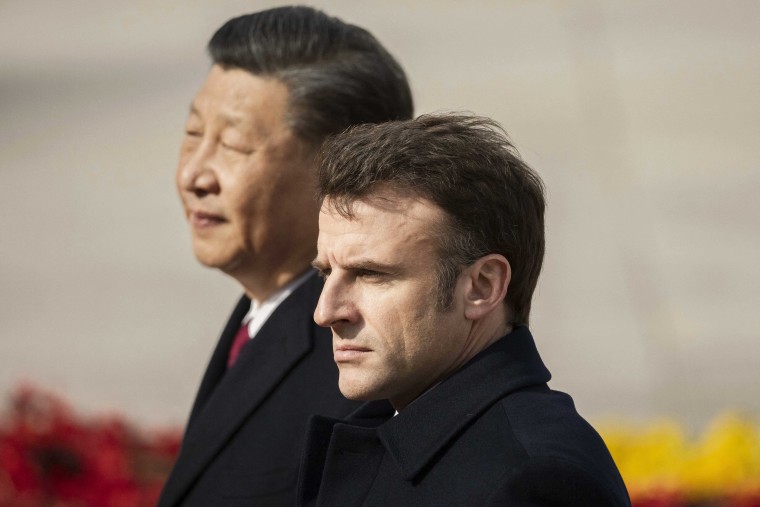
HONG KONG — Derided by concerned observers from Washington to Brussels, French President Emmanuel Macron’s recent trip to China did not go down well with allies. But he left his hosts feeling delighted.
Hundreds of cheering people were waiting to greet Macron when he arrived in the southern Chinese metropolis of Guangzhou this month, part of a high-profile state visit.
“He saw us and came right up to us and shook our hands who stood in the front row,” said Qiao Jiabao, a financial journalism student at Sun Yat-sen University, where Macron gave a speech. “I felt he was very gracious and proactive, even though we didn’t speak the same language,” Qiao told NBC News.
He said he and his friends joked that Macron, who has faced mass protests in France over his unpopular plan to raise the retirement age , had been treated so well in China that he might not want to go home.
When Macron returned to France, he faced another storm of criticism, this time over an interview in which he suggested that Europe should resist being drawn into a conflict over Taiwan and focus on “strategic autonomy” independent from both the United States and China.
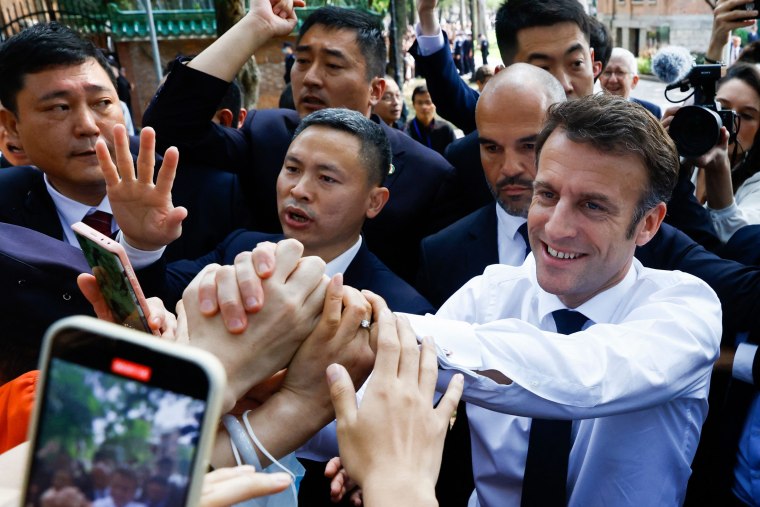
His comments drew a furious backlash and raised concerns that Beijing might be succeeding in sowing division between Washington and its allies as part of its push for a world in which America has to compete for dominance with multiple other powers.
But they were celebrated in China, where the state-backed nationalist tabloid Global Times said they signaled “a dead end for the U.S. strategy of luring Europe to contain China.” Lu Shaye, the Chinese ambassador to France, said Tuesday that Macron “spoke great truths” in the tradition of French independence.
“President Macron’s remarks have aroused a great echo at the international level,” he said on Twitter.
The status of Taiwan , a self-ruling democracy that Beijing claims as its territory, is the biggest flashpoint in U.S.-China relations, and Macron’s comments were published as China was conducting live-fire military exercises near the island in response to House Speaker Kevin McCarthy’s meeting in California with Taiwanese President Tsai Ing-wen .
“The worst thing would be to think that we Europeans should follow suit on this subject and adapt to the American rhythm and a Chinese overreaction,” Macron told Politico and the French newspaper Les Échos as he flew back from China. “Why should we go at the pace chosen by others?”
Macron later clarified that France’s Taiwan policy — recognizing Beijing as the sole legitimate government of China, while maintaining unofficial relations with Taipei, the same policy as the U.S. — had not changed. But he also defended his earlier comments, saying Europe had the right to act independently.
Being an ally “doesn’t mean being a vassal,” he said at a news conference in Amsterdam last week.
The White House has minimized Macron’s comments, saying it is “comfortable and confident” in the U.S. alliance with France, but they were heavily criticized by Republicans as underestimating the threat from China.
And Macron’s words were still reverberating as foreign ministers from the Group of Seven nations, which include the United States and France, gathered in Karuizawa, Japan, over the weekend. In a joint communiqué released Tuesday, the diplomats stressed unity as they said they recognized the importance of “engaging candidly” with China, the world’s second-largest economy, while working together on areas of common interest.
The Chinese Foreign Ministry said Tuesday that the G-7 statement “grossly interfered in China’s internal affairs” and that it had protested to Japan, which holds the group’s rotating presidency.
“The communiqué reflects the group’s arrogance, prejudice and deliberate desire to block and contain China,” spokesperson Wang Wenbin said at a regular news briefing.
Macron is among a number of European leaders to visit Beijing in recent months, including German Chancellor Olaf Scholz and Spanish Prime Minister Pedro Sánchez. But Chinese President Xi Jinping lavished extra attention on the French president, personally traveling with him to Guangzhou.
Macron was warmly received not only by Xi, but also by the Chinese public, who showered him with praise on social media.
Zhao Qing, who works in retail in eastern China, said Macron’s visit was a friendly sign and gave a boost to Chinese relations with France, as well as other European countries.
“I had a good impression when my wife and I visited France before, and maybe I can go there again in the future,” he said.
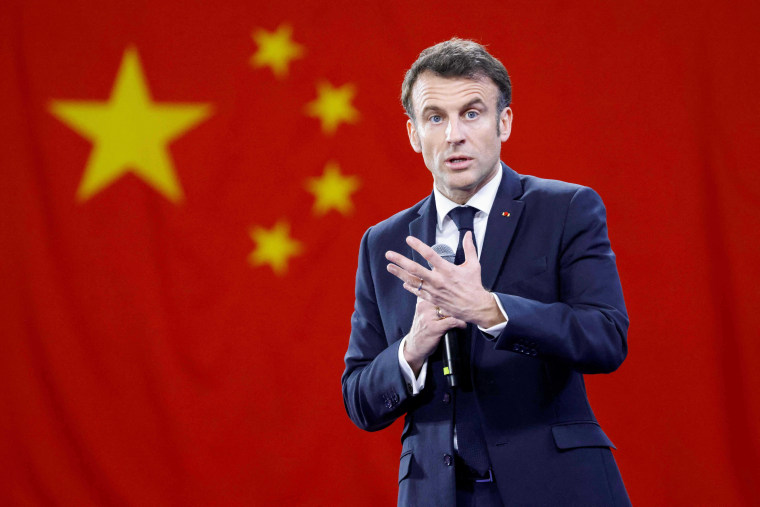
Macron and other leaders have good reason to visit China, said Wang Yiwei, director of the Center for European Studies at Renmin University of China in Beijing, even as efforts to reschedule Secretary of State Antony Blinken’s postponed trip to Beijing appear to stall.
“The visit really emphasized that China is a partner of Europe, not a rival,” Wang said.
If Europe distances itself from China as well as Russia, “their energy issue, economics, safety will solely depend on the U.S.,” he said. “Is that good for Europe?”
Chinese Foreign Minister Qin Gang told reporters last month that “China-Europe relations are not targeted, dependent, or subject to third parties.”
Critics said Macron’s comments undermined the image of European unity he was trying to project by visiting China at the same time as Ursula von der Leyen, the European Commission president.
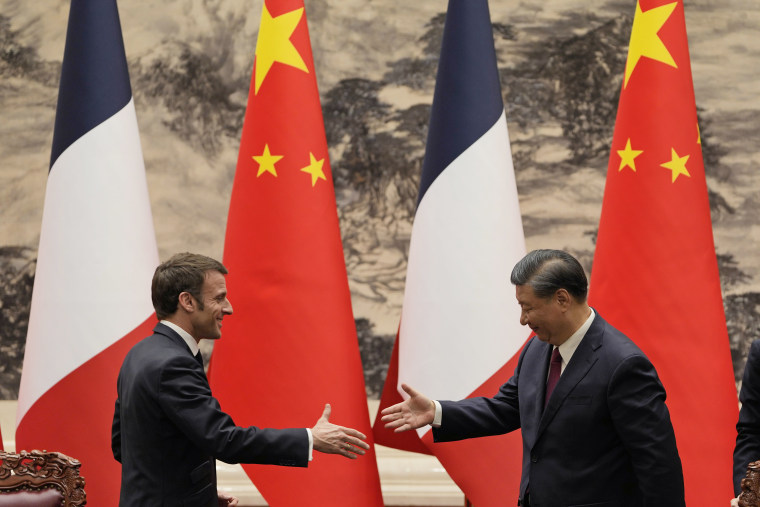
The Continent has struggled with how to balance economic concerns and rising tensions over Taiwan, human rights and the war in Ukraine. But, at least in public, leading officials have stuck close to their U.S. allies.
In a speech on relations between the E uropean Union and China last month, von der Leyen acknowledged Beijing’s might while calling on it to use that power responsibly on issues such as the Russian invasion of Ukraine , which Beijing has refused to condemn.
“It was actually a very clear message she was trying to convey, and Macron blurred this message tremendously in my view,” said Maria Demertzis, a senior fellow at Bruegel, a think tank based in Brussels.
Unlike the U.S., the E.U. — China’s largest trading partner — has viewed Beijing as an economic partner more than a security threat, she said.
“It does not consider China the enemy in ways that I think the U.S. does,” Demertzis said.
Von der Leyen’s speech indicated that the E.U., which has long tried to balance its relations with Washington and Beijing, is now “not totally aligned but siding with the U.S.” in its approach to China, she said.
But unless it speaks to Beijing with one voice, Demertzis said, “I think Europe risks not being taken seriously, quite frankly.”
In another speech Tuesday, von der Leyen said the relationship with China was too important for Europe not to define its own strategy.
“I believe we can — and we must — carve out our own distinct European approach that also leaves space for us to cooperate with other partners, too,” she told the European Parliament.
“And the starting point for this is the need to have a shared and very clear-eyed picture of the risks and the opportunities in our engagement with China.”
Jennifer Jett is the Asia Digital Editor for NBC News, based in Hong Kong.

- China Daily PDF
- China Daily E-paper
- Cross-Strait
- Cover Story
- Environment

French President Emmanuel Macron arrives in Beijing for state visit

BEIJING - At the invitation of Chinese President Xi Jinping, French President Emmanuel Macron arrived in Beijing on Wednesday afternoon for a state visit to China through Friday.
Macron will also visit Guangzhou, the capital city of South China's Guangdong province.
- Guangdong and Hong Kong universities sign agreement to cultivate talent
- 'A Thousand-Year Glance: Landscapes of Belt and Road countries in Thangka Paintings' exhibition held in Thailand
- China's top cyberspace regulator launches operation to combat illegal information
- Good quality water offshore reaches 85%
- Shenzhou XVIII completes in-orbit handover with Shenzhou XVII
- Serbian hooper finds second home in China

- International edition
- Australia edition
- Europe edition
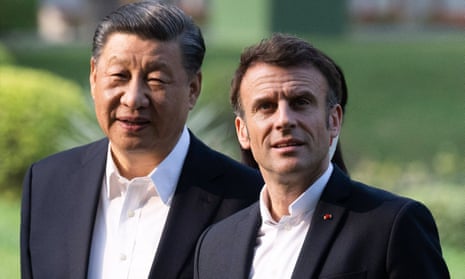
Macron sparks anger by saying Europe should not be ‘vassal’ in US-China clash
Alarm on both sides of Atlantic as French president warns against being drawn into any Taiwan conflict
Emmanuel Macron has flown into a storm of criticism after he said Europe should not become a “vassal” and must avoid being drawn into any conflict between the US and China over Taiwan.
The French president made the remarks in an interview on his plane after a three-day state visit to China , where he received a red carpet welcome by China’s president, Xi Jinping – a show of pageantry that alarmed some European China watchers.
Speaking to reporters from Les Echos and Politico , Macron said Europe should be a third power in the world order, along with the US and China. While the comments reaffirmed Macron’s long-term goal of “strategic autonomy” for Europe, namely avoiding military and economic dependencies, his remarks on Taiwan stoked anger and alarm on both sides of the Atlantic.
According to Les Echos, Macron said: “Do we [Europeans] have an interest in speeding up on the subject of Taiwan ? No. The worst of things would be to think that we Europeans must be followers on this subject and adapt ourselves to an American rhythm and a Chinese overreaction.”
He added it would be “a trap for Europe”, now it had developed more autonomy since the Covid pandemic, to get caught up in crises “that are not ours”. If there was an acceleration of conflict between the American and Chinese duopoly “we will not have the time, nor the means to finance our own strategic autonomy and we will become vassals, whereas we could become the third pole [in the world order] if we have a few years to develop this”.
Macron said the need for Europe’s “strategic autonomy” was now widely accepted and there had never been “such an acceleration of European power” as in recent years.
He also emphasised the risks to Europe of the US Inflation Reduction Act (IRA), a $369bn (£300bn) green subsidy plan, and overdependence on the dollar. However, he said Europe had reacted with great speed to come up with “our European IRA”, referring to plans to boost homegrown green tech and the production of critical raw materials.
And he suggested his talks with Xi had been useful in confronting “complacency on the part of China with regard to Russia”. The goal of the dialogue with China was to “consolidate common approaches” over the war in Ukraine, Macron said.
According to Politico, the Élysée presidential palace checked Macron’s quotes before publication as a condition of granting the interview and insisted on the removal of lines where Macron had spoken “even more frankly” about Taiwan and Europe’s strategic autonomy.
In a social media post linking to the Politico interview, the US Republican senator Marco Rubio said if Macron spoke for all of Europe, then the US should consider focusing its foreign policy on containing China and leave Europe to handle the war in Ukraine.
Rubio, who lost the Republican presidential nomination to Donald Trump in 2016, said he supported US aid for Ukraine but if Europe was going to pick sides over Taiwan a rethink was in order: “Maybe, we should basically say we are going to focus on Taiwan and the threats that China poses, and you guys handle Ukraine and Europe.” Seizing on the Politico disclaimer, Rubio said Macron had said “even worse” things before the Élysée edits.
The Wall Street Journal said in an editorial that the French president’s “unhelpful comments” would undermine US and Japanese deterrence against China in the western Pacific, while encouraging US politicians who wanted to reduce American commitments in Europe. “If President Biden is awake, he ought to call Mr Macron and ask if he’s trying to re-elect Donald Trump,” the paper wrote.
One MEP stressed that the French leader did not speak for the EU. “Macron says, ‘Europe should’ and ‘we Europeans’, but he speaks for France , he can’t really speak for Europe.
“It’s perhaps a bit surprising to stress strategic autonomy now in April 2023, because the world has changed in the last 14 months,” the person said, suggesting the Russian invasion of Ukraine had called into question Europe’s ability to become a third power in the global order as Macron proposes.
Norbert Röttgen, a German centre-right MP who is a member and former chair of the Bundestag’s foreign affairs committee, said Macron had turned his trip to China into “a PR coup for Xi and a foreign policy disaster” for Europe. “With his idea of sovereignty, which he defines in demarcation rather than partnership with the USA, he is increasingly isolating himself in Europe.”
Reinhard Butiköfer, an MEP who chairs the European parliament’s China delegation, described Macron’s China visit as a “complete disaster”. The German Green MEP, who has been sanctioned by Beijing over his stance on human rights in Xinjiang , also said Macron’s “pipe dream” of EU strategic autonomy and becoming a “third superpower” was “beyond the pale”. He added that the European Commission president, Ursula von der Leyen, had shown “a better alternative”.
Von der Leyen recently said the EU needed to reassess its relations with a Chinese government that had ramped up “policies of disinformation and economic and trade coercion”.
While Macron was praised in Brussels for inviting Von der Leyen to join him in Beijing, the reality of the visit only highlighted China’s attempts to divide and rule. While China rolled out the red carpet for Macron with a state banquet and military parade, Von der Leyen was given a chilly reception and excluded from the pageantry.
Supporters of Macron said the interview contained little that was new to either him or French foreign policy since Charles de Gaulle. Gérard Araud, a former French ambassador to Washington and the UN, said Macron had started an important debate at a time when “the temptation exists to consolidate into a ‘western bloc’ under American direction assured to be on the side of ‘good’”, adding: “It would be a mistake to give into this.”
The row recalls previous controversies such as when Macron declared in 2019 Nato was experiencing “brain death” , or when last year he infuriated central and eastern European allies by saying Russia would need security guarantees when the time came to negotiate a peace settlement with Ukraine.
Mujtaba Rahman, the head of Europe at the research firm Eurasia Group, said the timing of Macron’s latest comments was poor. “To make these remarks as Chinese military exercises encircled Taiwan – and just after his state visit to China – was a mistake. It will be interpreted as appeasement of Beijing and a green light to Chinese aggression.”
Rahman added that Macron’s interview was being seen as a parting gift to Xi – “another doomed attempt (after Putin) to sweet-talk an autocrat” – and suggested the French president may have been trying to boost his poll ratings in France by emulating De Gaulle. “More likely, it was just Macron being Macron, thinking ahead in an interesting way but not measuring the immediate political impact of his words,” Rahman said.
- Emmanuel Macron
- European Union
- Asia Pacific
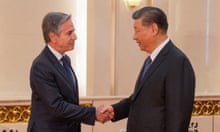
US has seen evidence of attempts by China to influence election, says Blinken

Macron criticises Rwanda-style asylum schemes days after UK passes bill
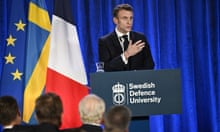
EU must defend Ukraine even if US reduces military support, Macron says

China holds citizen on spying charges after she did ‘admin’ work for US company
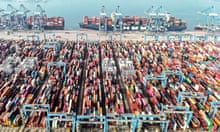
China’s many systemic problems dominate its outlook for 2024

Macron criticised from all sides after ‘reactionary’ press conference
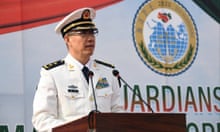
China names former navy chief Dong Jun as new defence minister

Macron looks to Sarkozy connection to head off far right in France

New French PM seeks to send strong message on law and order
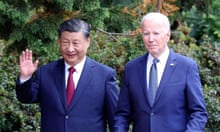
China praises ‘warm’ Xi-Biden meeting in change of rhetoric
Most viewed.
Macron to visit China after Beijing's Ukraine peace plan
Kyiv (Ukraine) (AFP) – French President Emmanuel Macron said Saturday he would visit China in April, and urged Beijing to pressure Russia to end the war in Ukraine.
Issued on: 25/02/2023 - 21:40 Modified: 26/02/2023 - 03:05
China has sought to position itself as a neutral party on the conflict, even as it has maintained close ties with Russia and helped scuttle a joint statement condemning the war at a G20 gathering in India.
It published a 12-point position paper on Friday that called for urgent peace talks and a "political settlement" to end the conflict.
Ukrainian President Volodymyr Zelensky on Friday also expressed hopes to meet Chinese counterpart Xi Jinping, calling it "important for world security".
Macron said Saturday he would visit China in "early April" and urged Beijing to help "put pressure" on Russia to end the war.
"The fact that China is engaging in peace efforts is a good thing," Macron said on the sidelines of an agricultural show in Paris, in reference to the position paper.
Peace was only possible if "Russian aggression was halted, troops withdrawn, and the territorial sovereignty of Ukraine and its people was respected", he added.
Earlier on Saturday, the Chinese foreign ministry said Belarusian leader Alexander Lukashenko would pay a state visit from February 28 to March 2 at Xi's invitation.
A long-time ally of Russian President Vladimir Putin, Lukashenko allowed his country to be used as a launchpad for Moscow's invasion of its pro-Western ally on February 24 last year.
Kyiv has expressed concerns that Belarus could again support Moscow in its war effort, with the countries announcing the creation of a joint regional force last October.
Chinese foreign minister Qin Gang told his Belarusian counterpart Sergei Aleinik that Beijing was willing to work with Minsk to deepen mutual political trust during a phone conversation on Friday, China's ministry said in a statement.
China would also continue to support Belarus in maintaining national stability and oppose attempts by "external forces" to interfere in its internal affairs or impose "illegal" unilateral sanctions on Minsk, Qin told Aleinik.
Diplomatic rifts exposed
The diplomatic rift between Beijing, Moscow and the West was exposed on Saturday as G20 finance ministers failed to adopt a joint statement on the global economy after China sought to water down references to the Ukraine war.
Russia said the United States, the European Union and the G7 "destabilised" the talks in India by trying to impose their "diktat".
The Chinese position paper urged all parties to "support Russia and Ukraine in working in the same direction and resuming direct dialogue as quickly as possible".
It also made clear its opposition to the use and threat of deploying nuclear weapons, after Putin threatened to use Moscow's atomic arsenal in the conflict.
Some of Ukraine's allies have expressed scepticism at China's commitment to brokering peace, nodding to Beijing's close ties to Moscow. China has denied a claim by US Secretary of State Antony Blinken that it was "considering providing lethal support" to Russia.
Macron urged China "not to supply any arms to Russia" and sought Beijing's help to "exert pressure on Russia to ensure it never uses chemical or nuclear weapons and it stops this aggression prior to negotiations".
Zelensky did not specify when or where talks with Xi would happen, but expressed hope Friday that China would support a "just peace" in Ukraine and that Beijing would not supply weapons to Russia.
Spring counter-offensive
On Sunday, the deputy chief of Ukrainian military intelligence told a German newspaper group that a fresh push to retake seized territory was planned for spring, adding Kyiv's forces would "not stop until we get our country back to its 1991 borders".
"One of our strategic military objectives is to try to drive a wedge into the Russian front in the south -- between Crimea and Russian territory," Vadym Skibitsky said.
Beyond that, "the objective of our counter-offensive is to liberate all the occupied territories of Ukraine, including Crimea".
Skibitsky also raised the possibility of future Ukrainian strikes on "arms depots or military equipment on Russian territory, for example around the city of Belgorod, from where attacks on Ukraine are launched".
Yevgeny Prigozhin claimed the capture of Yagidne, a short distance from central Bakhmut, which has become a key political and symbolic prize in the battle to control the eastern Donbas region.
burs/imm/kjm/smw/dva
The content you requested does not exist or is not available anymore.
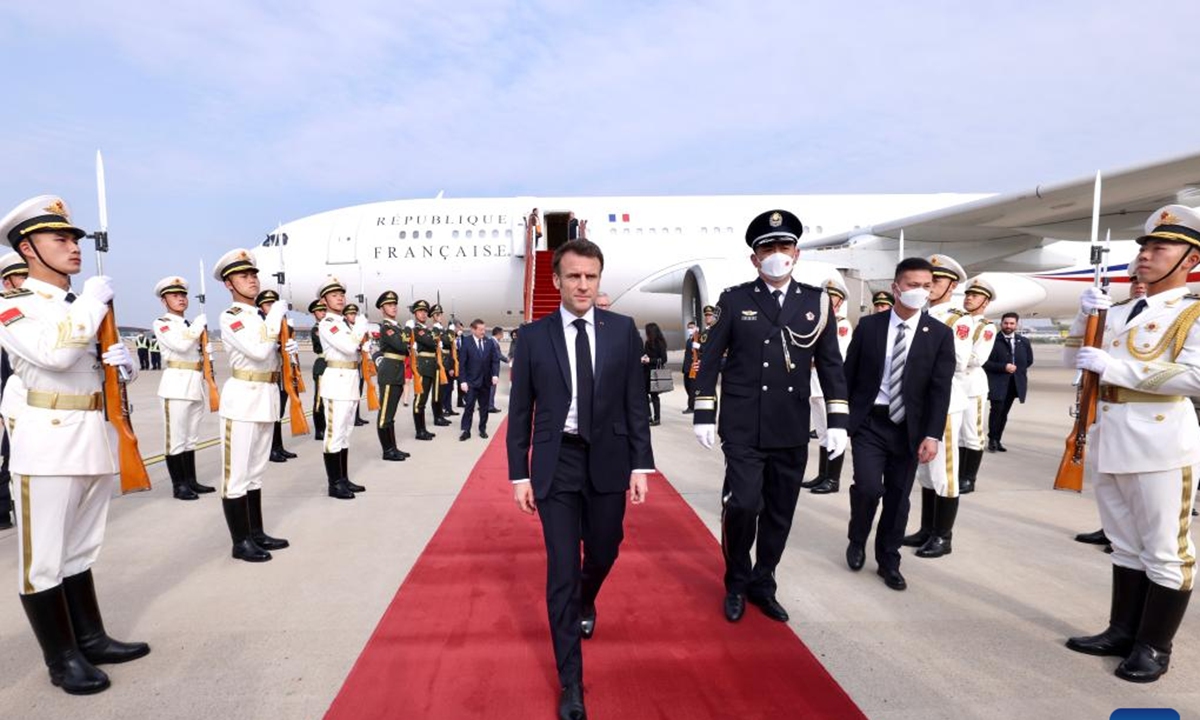
French President Emmanuel Macron arrives at Beijing Capital International Airport in Beijing, capital of China, April 5, 2023.Photo:Xinhua
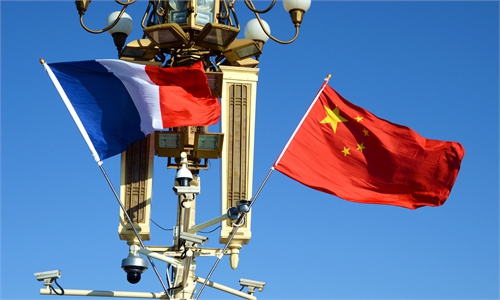
China and France are expected to eye further economic cooperation in fields such as aviation, nuclear power and ...
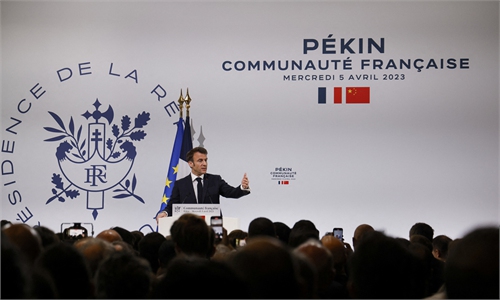
French President Emmanuel Macron arrived in Beijing on Wednesday, embarking on a three-day visit of “restarting exchanges and ...
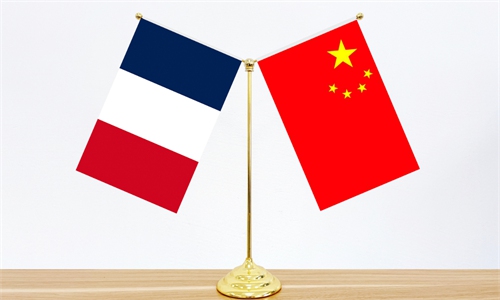
Five documentaries jointly produced by China and France will be released on both domestic and foreign mainstream platforms ...

- Subscribe Digital Print

- LDP funds scandal
- Latest News
- Deep Dive Podcast
Today's print edition
Home Delivery
- Crime & Legal
- Science & Health
- More sports
- CLIMATE CHANGE
- SUSTAINABILITY
- EARTH SCIENCE
- Food & Drink
- Style & Design
- TV & Streaming
- Entertainment news
Why Macron’s state visit to China was a dud
The french president is building castles in the air with his quest for ‘strategic autonomy’.
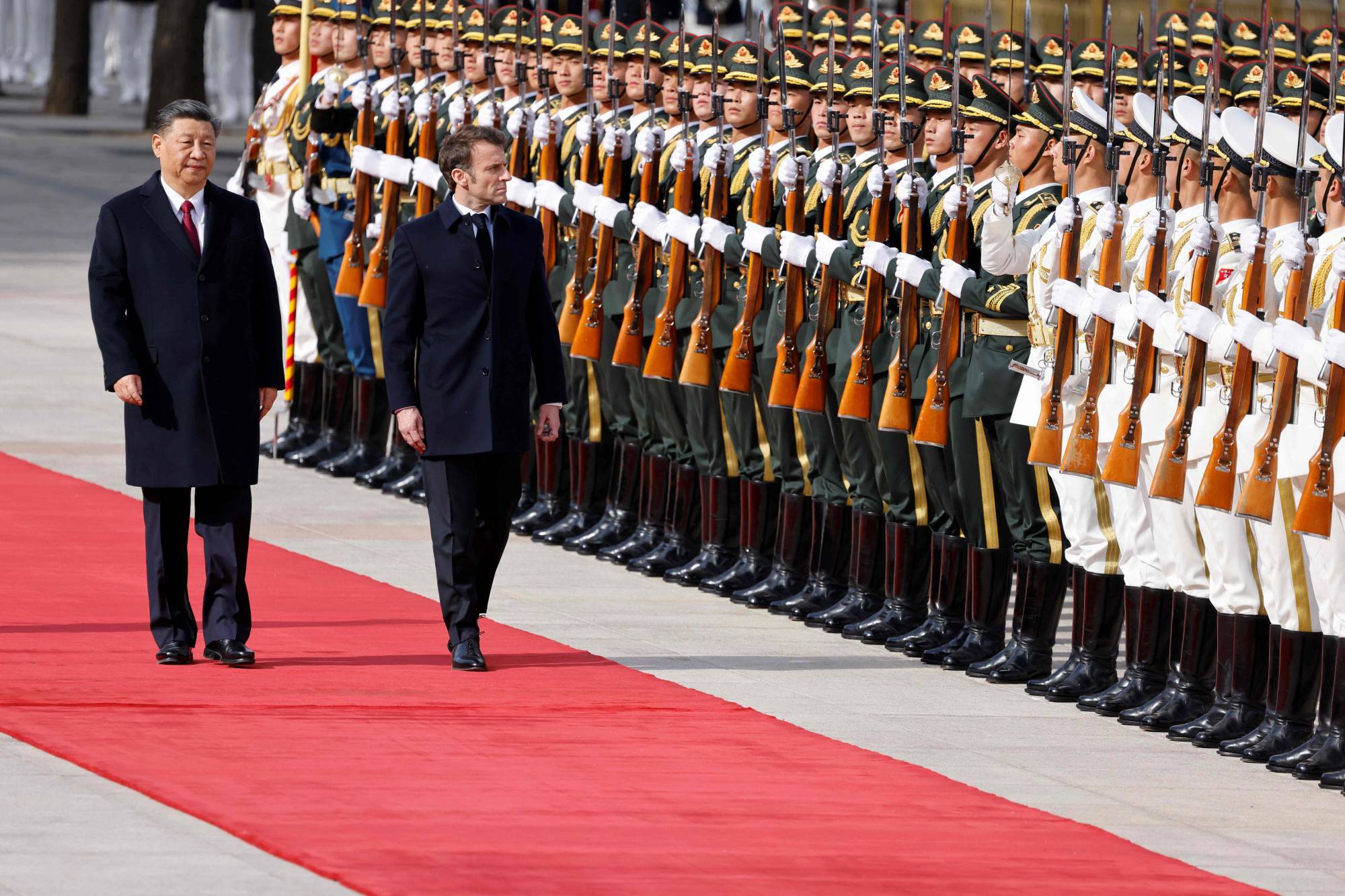
Emmanuel Macron’s tendentious trip to China was light on deliverables and heavy on stumbles, casting shadows anew on the French president’s diplomatic mojo.
Instead, Xi called for an expeditious resumption of peace talks, reiterating the Chinese view that “all sides” have “reasonable security concerns.”
In a private meeting with the Chinese leader, Macron urged him not to arm Russia, to which Xi replied that “this war is not his,” according to a diplomat quoted by Politico.
It was unclear why Macron thought he could succeed where others have not. Xi has bet heavily on his de facto alliance with Putin. In Beijing’s great-power competition with Washington, he finds Moscow useful. Russia can tie up U.S. military resources that would otherwise be deployed to the Indo-Pacific to counter China. Moscow also stands by Beijing in its broader push to undermine America’s global leadership.
If Russia is defeated in Ukraine, Xi will lose twice: China’s geopolitical position will be weakened and his personal credibility will take a hit. For these reasons, he will not abandon Putin or do anything to hasten Russia’s defeat, even if he eschews open support of Moscow.
Macron failed to extract even an agreement from Xi to speak with Ukrainian President Volodymyr Zelenskyy, something the Chinese leader has not done since the war started (but has teased in recent months).
Had the French president sought to exert real influence on Xi, he would not have brought a large business delegation with him to China that included the CEO of Airbus. He would have made new business deals contingent upon concrete progress ending the Russia-Ukraine war.
By traveling with the business leaders, Macron telegraphed that trade would trump politics and sacrificed any leverage he could have brought to the table.
If he had quit while he was ahead, Macron might have been able to argue that the trip was still useful for the European Union because he spoke to Xi face to face about the bloc’s top security concern. He did travel together with European Commission President Ursula von der Leyen, who also warned Xi not to arm Russia and pressed him to do more to end the war.
On that single issue, Macron and von der Leyen conveyed lucid European unity.
Unfortunately, the French president undercut both the EU and the broader trans-Atlantic alliance with his ill-conceived “strategic autonomy” push. Macron imagines that France can lead a stronger Europe that serves as a “third” pole in geopolitics, beholden neither to the United States nor China. He reckons he can achieve his vision by rhetorically distancing France and the EU from the U.S. with statements like being an ally “does not mean being a vassal.”
In reality, Macron well knows that Russia would have likely annexed a bigger part of Ukraine by now if not for American intervention. Europe lacks adequate military muscle to safeguard its neighborhood.
To be sure, Macron has reason to gripe about the United States. The AUKUS (Australia, U.K. and U.S.) nuclear submarine deal blindsided France, costing it a $65 billion contract to build Australian subs. France is concerned that America’s massive green subsidies will reduce European firms’ competitiveness in North America. And Paris rejects Washington’s move to decouple from China’s economy, seeing it as destabilizing.
Yet Washington and Paris’s interests align in more areas than they conflict. In contrast, China poses a challenge to the rules-based order that underpins the EU — from trade practices to human rights. For Macron to believe he can play the China card to maximize France’s and Europe’s respective geopolitical positions is at best myopic.
Rather, China can most benefit from Macron’s overtures. Xi is in the midst of a diplomatic offensive to revivify China’s global interests following its long COVID-19 exile. Though his lackluster Ukraine peace plan has fizzled, he did help erstwhile enemies, Saudi Arabia and Iran re-establish, diplomatic ties. Feting the president of France in China adds another feather to his hat.
Xi used Macron’s trip for propaganda purposes as well, vowing that the two countries would continue to “oppose cold war mentality and bloc confrontation,” a barely veiled swipe at U.S.-led efforts to contain China.
Macron reserved his biggest misstep for after he departed China though. In an airborne interview with Politico on the way back to France, he seemed to hold Beijing and Washington equally responsible for the China-Taiwan cross-strait tensions. He said that Europe should not “take our cue from the U.S. agenda and a Chinese overreaction,” adding the EU should not become ensnared in “crises that are not ours, which prevents it from building its strategic autonomy.”
The comments smacked of hypocrisy, given Europe’s need for massive U.S. support in its own backyard. While Europe does not have the same direct security stake in the Indo-Pacific as the U.S. — though France has a presence — it still relies on the same shipping routes near Taiwan as the rest of the world, not to mention Taipei’s advanced semiconductors.
Worse yet, Macron made his remarks about Taiwan amid Chinese military exercises intended in part as a rehearsal for a future attack on the island democracy. Beijing launched the three-day exercises to express its anger at President Tsai Ing-wen's meeting with U.S. House Speaker Kevin McCarthy in California.
While less menacing than those held last August following then-U.S. House Speaker Nancy Pelosi’s Taiwan visit, they nonetheless included the deployment of China’s Shandong aircraft carrier near eastern Taiwan — suggesting the People’s Liberation Army might pose a greater threat to the entire island than previously thought.
If Macron understood how China’s leadership thinks, he would not have shrugged off the role Europe can play in ensuring cross-strait stability. Europe may lack America’s martial clout, but it is an economic juggernaut and influential voice in international organizations. It has leverage that can impact China's calculations.
But by endorsing a noninterventionist stance, he gave Beijing the impression that France and Europe viewed Taiwan as “an internal Chinese affair.” This could embolden Beijing to further pressure Taipei.
Fortunately, there has been a swift pushback against Macron’s Taiwan remarks from the trans-Atlantic alliance. Republican lawmakers in the U.S. have denounced them in colorful terms.
For its part, the Germany Foreign Ministry has evinced a more nuanced perspective. A spokesperson quoted by Politico said that Beijing’s martial muscle flexing “ran counter to contributing to peace” in the region and heightens “the risk of unintended military clashes.”
Ironically, as Macron tries to woo Xi, he is coming up nearly as short as when he tried to convince Putin to forsake invading Ukraine. In both cases, the French president believed he could persuade uncompromising dictators to do what Europe wanted — but not what they wanted — simply by talking to them.
The sooner the French president realizes that strongmen will dismiss diplomacy not backed up by a willingness to use credible hard power, the better off Europe and the trans-Atlantic alliance will be.
Matthew Fulco is a journalist and geopolitical analyst with more than a decade of experience covering China and Taiwan. He also regularly contributes to the Economist Intelligence Unit.
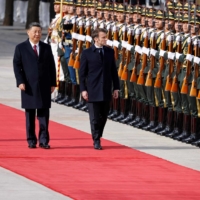
In a time of both misinformation and too much information, quality journalism is more crucial than ever. By subscribing, you can help us get the story right.

Upcoming State Visit: Chinese Leader Xi Jinping to Meet Macron in France
I n a diplomatic initiative scheduled for May, Chinese President Xi Jinping is expected to visit France for discussions with President Emmanuel Macron, as reported by Politico on March 18.
This important political engagement is set to coincide with the landmark 60th anniversary of establishing diplomatic ties between France and China.
As per a source who spoke on the condition of anonymity to Politico, the event, despite its significance, will focus more on serious discussions relating to pressing economic and geopolitical challenges rather than celebratory events.
The Chinese administration’s recent moves have seen a strengthening of its relationship with Russian President Vladimir Putin. This is happening at a time when European leaders, including President Macron, continue to offer unwavering support to Ukraine. Xi has notably refrained from criticizing Russia’s military actions in Ukraine and has chosen to abstain during UN voting sessions addressing the conflict.
Earlier in the year, Reuters disseminated news that Russia has become China’s main oil supplier, further bolstering their ties. Additionally, combined naval exercises alongside Iran in the Gulf of Oman have also been initiated by the two countries.
While Ukraine maintains lines of communication with China open despite Beijing’s close association with Russia during the conflict, the effectiveness of these efforts remains in question.
Following President Zelensky’s proposal of a 10-point plan for peace in November 2022, there have been a series of four advisory meetings with national security advisers at the helm, wherein China was present at only one such gathering.
Just this week, the Chinese Ambassador to Switzerland signaled Beijing’s consideration of a potential role in the upcoming peace summit dedicated to the Ukraine war.
Switzerland has accepted to host the worldwide summit on the conflict in Ukraine starting January 2024. China, among over 160 other nations, will have the opportunity to discuss Kyiv’s peace plan and work towards a unified stance on how to reestablish sovereignty within Ukraine. The exact date for the summit, however, has not yet been confirmed.
China is reportedly exerting influence on European decision-makers to include Russia in future peace negotiations, including the Swiss summit. Beijing has even gone so far as to threaten to boycott any peace talks that exclude their Russian allies. Yet, Moscow has indicated that it would avoid the Swiss-hosted summit even if it received an invitation.
The previous encounter between Presidents Xi and Macron transpired in Beijing during April 2023. During their meeting, it’s reported that the French President endeavored to encourage Xi to leverage his influence on Moscow with the aim of bringing an end to the conflict.

FAQ Section
Why is xi jinping’s visit to france significant.
Xi Jinping’s visit is significant as it marks the 60th anniversary of diplomatic relations between France and China and provides an opportunity for high-level talks on geopolitical and economic issues.
What are China’s positions on Russia and Ukraine?
China has grown closer to Russia in recent years, abstaining from condemning Russia’s actions in Ukraine at the UN and undertaking joint military exercises with Russia. Despite maintaining open diplomatic channels, China’s engagement in Ukraine’s peace process advisory meetings has been limited.
Has China agreed to participate in the upcoming peace summit on Ukraine?
China is considering participating in the global peace summit hosted by Switzerland, which aims to discuss Ukraine’s peace formula and restore the country’s sovereignty.
What is the stance of China and Russia regarding the peace summit in Switzerland?
China is advocating for Russia’s inclusion in future peace talks; however, Beijing has stated that it will boycott any summit that excludes Russia. Conversely, Russia has indicated it would not attend even if invited.
What was the result of Macron’s previous meeting with Xi Jinping?
In their previous meeting in Beijing in April 2023, Macron attempted to persuade Xi to use China’s influence to encourage Russia to end the war in Ukraine.
The forthcoming state visit by Chinese President Xi Jinping to France in May provides a critical platform for both China and France to navigate complex international relations, contributing to pivotal discussions on current economic and geopolitical issues, marking a synergistic moment on a historical milestone. With China’s intricate position in global diplomacy and its partnership with Russia amidst the ongoing Ukrainian conflict, the outcomes of these high-level meetings between Xi and Macron could potentially influence the broader geopolitical landscape.
Note: We, TheUBJ, do not produce the news content presented here. The information provided is a rewritten version sourced from various sources on the internet through AI news feed technology. We do not claim ownership or authorship of the news content. The original https://kyivindependent.com/politico-xi-jinping-to-visit-france-in-may/ link is provided for reference.
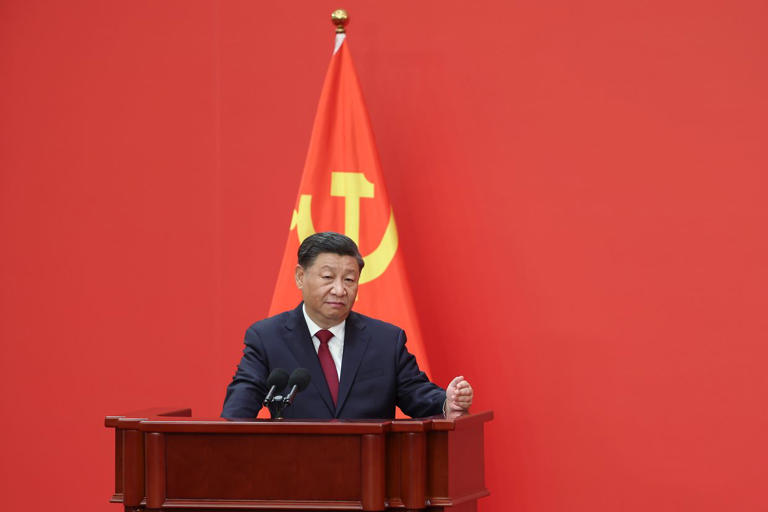
- Work & Careers
- Life & Arts
Become an FT subscriber
Try unlimited access Only $1 for 4 weeks
Then $75 per month. Complete digital access to quality FT journalism on any device. Cancel anytime during your trial.
- Global news & analysis
- Expert opinion
- Special features
- FirstFT newsletter
- Videos & Podcasts
- Android & iOS app
- FT Edit app
- 10 gift articles per month
Explore more offers.
Standard digital.
- FT Digital Edition
Premium Digital
Print + premium digital, weekend print + standard digital, weekend print + premium digital.
Today's FT newspaper for easy reading on any device. This does not include ft.com or FT App access.
- 10 additional gift articles per month
- Global news & analysis
- Exclusive FT analysis
- Videos & Podcasts
- FT App on Android & iOS
- Everything in Standard Digital
- Premium newsletters
- Weekday Print Edition
- FT Weekend Print delivery
- Everything in Premium Digital
Essential digital access to quality FT journalism on any device. Pay a year upfront and save 20%.
- Everything in Print
Complete digital access to quality FT journalism with expert analysis from industry leaders. Pay a year upfront and save 20%.
Terms & Conditions apply
Explore our full range of subscriptions.
Why the ft.
See why over a million readers pay to read the Financial Times.
International Edition
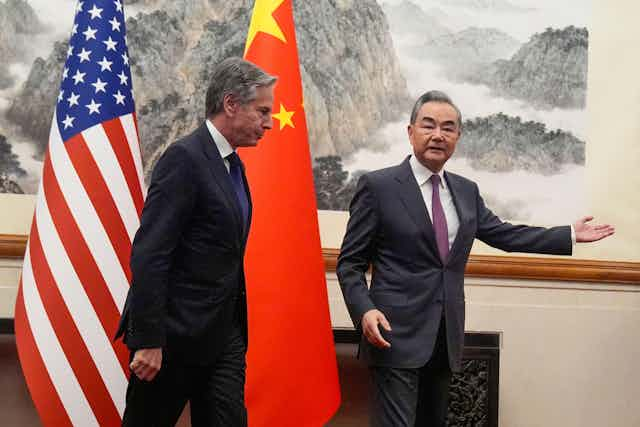
Why is China risking US sanctions by arming Russia? Survival
Assistant Professor of Business Economics, University of Nottingham
Disclosure statement
Chee Meng Tan does not work for, consult, own shares in or receive funding from any company or organisation that would benefit from this article, and has disclosed no relevant affiliations beyond their academic appointment.
University of Nottingham provides funding as a founding partner of The Conversation UK.
View all partners
US secretary of state Antony Blinken fired a warning salvo towards China during a G7 foreign ministers’ meeting on the Italian island of Capri on April 20. The US’s top diplomat said that China is a “prime contributor” of weapons-related technology to Russia, and was fuelling what is the “biggest threat to European security since the end of the Cold War”.
As Blinken detailed further when he landed in Beijing this week , while China has complied with US’s requests not to sell arms to Russia during the Ukraine war, the list of items they are selling, which could have military use, is extensive. They include semiconductors, drones, helmets, vests, machine tools and radios .
Apparently, the Chinese resupply of the Russian industrial complex also undermines Ukrainian security . And unfortunately for China, Chinese support of the Kremlin’s war effort is likely to earn Chinese firms sanctions from the US government.
Why then is Beijing aiding Moscow so ardently even when imminent US sanctions are going to aggravate its already weak economy ? One word: survival.
China’s need for allies
China realises that if it wishes to break the US monopoly on power, it can’t go about it alone. Aside from requiring a strong Russia to help reform the US-dominated international system, China needs Russia for its long-term survival.
There is a famous Chinese idiom: “ Once the lips are gone, the teeth will feel the cold .” (Meaning that when two things are interdependent, the fall of one will affect the other.) Right now, the west is dealing with the Russian rogue state . But if Russia falls, Beijing realises that the west could consolidate its resources to deal with the “Chinese threat” . Therefore, Beijing must aid Moscow.
At present, presidents Xi Jinping and Vladimir Putin enjoy a close friendship . The closeness of both regimes became more apparent through a joint statement released on February 4 2022, which declared that there were “no limits” to Sino-Russo friendship and no “forbidden” areas of cooperation.
But let’s get one fact straight: China-Russia relations have not always been rosy . Both the Soviet Union and China had experienced massive bouts of tension over the communist doctrine and had disputes over border issues .
Relations became so tense that both communist regimes broke off their formal alliance in 1961, and Chinese and Russian soldiers later clashed in northeast China and the Xinjiang region.
Not surprisingly, there’s lingering distrust on both the Chinese and Russian sides, and Chinese experts fear that Russia may prioritise its own interest over bilateral ties.
For instance, if a renewed Trump presidency does occur, the US may express less support for Ukraine and improve ties with Russia. In such a scenario, the Kremlin may prioritise better ties with the west and may withhold support for China’s struggle against the US.
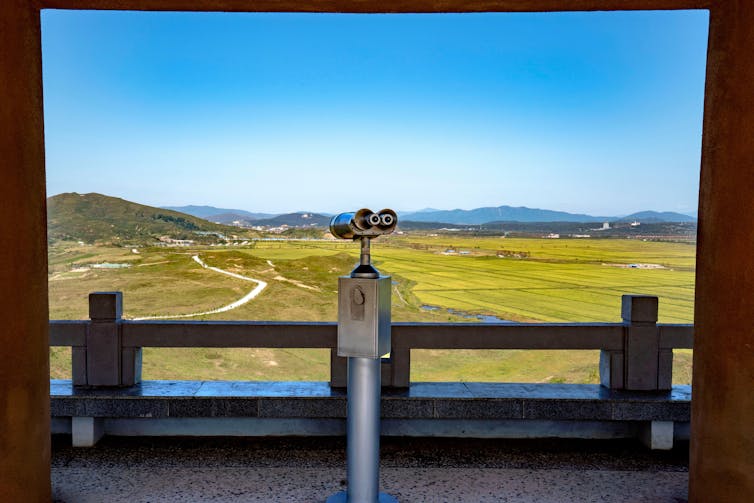
Incidentally, China’s distrust of Russia and existential concerns may have fuelled a recent high-level visit from Beijing to Pyongyang, North Korea. On April 13 2024, China’s top legislator and third most senior Chinese communist leader , Zhao Leji, paid an official visit to Pyongyang.
During the meeting with North Korean strongman Kim Jung Un, Zhao claimed that the meeting was meant to reaffirm good relations and deepen bilateral cooperation between the two nations.
So, was Zhao simply making a courtesy call?
The timing of the meeting cannot be more curious as it occurred amid surging North Korea-Russia relations. Reports indicate that Russia is purchasing large quantities of munitions from North Korea to fuel the Kremlin’s war effort against Ukraine. This would have brought Moscow and Pyongyang closer together .
The reality is that Pyongyang has traditionally exploited Russian and Chinese rivalry to achieve its goals. So, the strategy of pitting the Chinese against the Russians comes right off a chapter in the realpolitik playbook.
But the truth is Beijing cannot afford to lose its influence on North Korea to anyone else, be it American or Russian. This is because China’s security risk hinges on North Korea’s dependence on China.
North Korean threats
This fear is not unfounded. North Korea has a tradition of defying China. This came in form of the execution of Kim Jung Un’s pro-Chinese uncle , the assassination of Kim Jong Nam in Malaysia, or North Korea’s high-profile weapons tests .
More importantly, Beijing fears that if North Korea becomes a fully-fledged nuclear power, it might even detonate nuclear weapons on Chinese soil .
This all sounds strange, since both regimes signed a treaty of mutual defence and cooperation in 1961 that was renewed in 2021 . But beneath the veneer of friendship lies deep rooted resentment that has been festering for centuries.
Korea used to be a tributary state to imperial China and has played second fiddle to the Chinese for centuries. So when the Chinese interfered with the course of the Korean War, and even normalised ties with North’s primary foe , such actions not only angered North Korea, but also opened up historical wounds of being China’s vassal .
If Beijing wishes to maintain a major foothold in North Korea it needs to contain non-Chinese influence surrounding Pyongyang at all costs. It does so with a two-pronged approach.
First, China sends Zhao to cajole Kim Jung Un and assure the North Korean strongman that Beijing has his back. Second, China sends weapons and technology to Russia so that the Kremlin’s arms dependence on Pyongyang diminishes.
At first glance, Beijing’s supply of arms and technology to the Kremlin seem unrelated to Zhao’s visit to Pyongyang. But that simply isn’t true.
- North Korea
- North Korea missiles
- Give me perspective
- Ukraine invasion 0222

Program Manager, Teaching & Learning Initiatives

Lecturer/Senior Lecturer, Earth System Science (School of Science)

Sydney Horizon Educators (Identified)

Deputy Social Media Producer

Associate Professor, Occupational Therapy
Advertisement
Supported by
These Issues Are Testing the U.S.-China Thaw
Secretary of State Antony J. Blinken is in China this week as tensions have risen over trade, security, Russia’s war on Ukraine and the Middle East crisis.
- Share full article

By Ana Swanson , David Pierson and Olivia Wang
Ana Swanson covers trade and the U.S.-China relationship and is accompanying Mr. Blinken on his trip. David Pierson covers China’s foreign policy and its influence in the world.
Secretary of State Antony J. Blinken is meeting officials in China this week as disputes over wars, trade, technology and security are testing the two countries’ efforts to stabilize the relationship.
The United States is heading into an election year in which President Biden will face intense pressure to confront China’s authoritarian government and offer new protections for American businesses and workers from low-priced Chinese imports.
China is courting foreign investment to help its sluggish economy. At the same time, its leader, Xi Jinping, has been bolstering national security and expanding China’s military footprint around Taiwan and the South China Sea in ways that have alarmed its neighbors.
Mr. Biden and Mr. Xi have held talks to prevent their countries’ disputes from spiraling into conflict, after relations sank to their lowest point in decades last year. But an array of challenges could make steadying the relationship difficult.
Showdowns Over China’s Territory Claims
The United States has been pushing back against China’s increasingly assertive claims over swaths of the South China Sea and the self-governed island of Taiwan by building security alliances in Asia.
That effort has prompted more concerns in Beijing that the United States is leading a campaign to encircle China and contain its rise.
In meetings earlier this month, Mr. Biden met with the leaders of Japan and the Philippines. They discussed territorial conflicts in the South China Sea, including China’s “repeated harassment of lawful Philippine operations,” the U.S. government said.
Encounters between Chinese and American military ships and planes in the Taiwan Strait and the South China and East China Seas have continued, raising concerns that an accident could trigger a confrontation between the two powers. That is why U.S. officials have insisted on maintaining close military communication. High-level contacts between the two armies were restored earlier this year after China froze communication in response to former House speaker Nancy Pelosi’s visit to Taiwan in August 2022.
China says the United States and its allies are stoking confrontation and should not interfere in the region’s affairs. It has already bristled about the United States and the Philippines launching annual joint military exercises this week. The U.S. Army also deployed for the first time , as part of an exercise, a midrange missile system in the Philippines that could reach targets in China.
To counter Washington’s efforts, China has been trying to shore up ties with nonaligned countries in the region. The country’s top diplomat, Wang Yi, visited Indonesia, Cambodia and Papua New Guinea last week, around the same time that Mr. Blinken met with foreign ministers from the Group of 7 nations, a grouping Beijing considers a rival for global influence.
Curbing the Flow of Fentanyl
U.S. officials say China has played a concerning role in providing the chemicals and precursors that are used to make the powerful drug of fentanyl.
In a meeting in San Francisco in November, President Biden and Mr. Xi resolved to cooperate on tracking and cutting down on those flows. U.S. officials say China has started making some progress on that account, but they’re likely to urge further action.
In a report released last week, a House Congressional committee focused on China alleged that China had actively promoted the supply of fentanyl precursors to the United States, including by subsidizing exporters. A State Department official said that Chinese authorities had started taking action against Chinese synthetic drug and chemical precursor suppliers, but that the U.S. wanted to see progress.
China has long denied playing a major role in the fentanyl crisis in the United States and has deflected blame by saying it was a victim of Western powers during the Opium War.
Trade and Technology Restrictions
The United States and China still have one of the world’s most extensive trading relationships, but it has grown even more contentious in recent months.
U.S. officials have urged China to scale back its exports of inexpensive electric vehicles and other green energy goods, saying they are a threat to American jobs. They are weighing whether to raise tariffs on Chinese-made cars and solar panels, in order to block more Chinese imports from the United States.
Last week, the Biden administration announced it would triple some tariffs on steel and aluminum products from China and begin an investigation into unfair practices by the Chinese shipbuilding, maritime and logistics sectors.
The Biden administration also continues to add more restrictions on selling advanced chips and the machinery used to make them to China, out of concern that AI could aid the Chinese military.
And on Tuesday, the U.S. Senate passed a bill that could force TikTok’s Chinese owner to either sell the app or face being banned in the United States. The ban is likely to be challenged in court.
Beijing has opposed the restrictions, which Mr. Xi has said are an attempt to deny China’s “legitimate right to development.” In response, he has called for China to promote “new productive forces” — a government mantra aimed at bolstering the country’s economy through technology and innovation in the hopes of becoming more self-reliant.
Cybersecurity and Election Interference
U.S. officials have expressed concerns that China may seek to influence the outcome of the upcoming U.S. presidential election, including by orchestrating social media campaigns to influence American public opinion.
The National Security Agency said last week that there were also more signs that China was trying to gain access to critical American infrastructure in order to threaten those systems in the event of a conflict. Last year, Microsoft said it discovered malicious code spread by Chinese government hackers embedded in telecommunications systems in Guam and elsewhere in the United States.
While Beijing has denied engaging in cyberattacks and election interference, recently leaked documents show China has developed a sophisticated network of state-sponsored hackers for hire that have targeted databases around the world.
Russia’s War on Ukraine
American officials have made clear that they see China’s sale to Russia of chips, machine tools, drones and other materials that are used in the war in Ukraine as one of the biggest obstacles in the relationship between Beijing and Washington.
And they believe that getting China to withdraw that support could determine the outcome of the war.
China has tried to walk a careful line of not providing Russia with “lethal support,” like weapons, while still supporting Moscow. In early April, Chinese leader Xi Jinping met with Russia’s foreign minister and reaffirmed China’s partnership with Russia.
Even as tensions between China and the United States have eased, Mr. Xi and President Vladimir V. Putin of Russia have remain closely aligned. The two leaders have sought to weaken Washington’s global dominance, blaming “U.S. hegemony” for constraining their national ambitions.
Exerting Influence on Iran
U.S. officials, including Mr. Blinken, hoping to avoid a wider war in the Middle East, have asked China to use its sway over Iran to persuade it not to escalate its confrontation with Israel.
As like-minded critics of the West, China and Iran have had close diplomatic ties for more than 50 years. That relationship has grown economically as China has pledged to invest billions in Iran in exchange for oil and fuel.
Beijing had described Iran’s missile and drone attacks directed at Israel earlier this month as an “act of self-defense,” after what was widely believed to be an Israeli strike killed seven Iranian officials.
Since Israel’s war in Gaza began, China has courted solidarity with the Muslim world by blaming the United States for decades of instability in the Middle East. Beijing has also not condemned Hamas for its terror attacks on Israel on Oct. 7.
Ana Swanson covers trade and international economics for The Times and is based in Washington. She has been a journalist for more than a decade. More about Ana Swanson
David Pierson covers Chinese foreign policy and China’s economic and cultural engagement with the world. He has been a journalist for more than two decades. More about David Pierson
Olivia Wang is a Hong Kong-based reporter and researcher who covers mainland China and Hong Kong. More about Olivia Wang

IMAGES
COMMENTS
Published 12:04 AM PDT, April 15, 2023. A week ago, I traveled with a group of journalists assigned to cover French President Emmanuel Macron's trip to China. It was my first trip to the country, and I was excited. I have covered many state trips in my career as a photojournalist with The Associated Press.
Keith Bradsher reported from Shanghai, and David Pierson from Singapore. April 7, 2023. President Emmanuel Macron of France concluded a three-day visit to China on Friday, with the two countries ...
Macron's flawed diplomacy in China. In a notably hawkish speech last week ahead of the visit von der Leyen warned Xi that China's interactions with Putin's war "will be a determining ...
Roger Cohen, the Paris bureau chief, traveled to Beijing and Guangzhou to cover Emmanuel Macron's visit. President Emmanuel Macron of France complimented China's top leader on the "very ...
From 5 to 8 April 2023, the French President is visiting China. He spent the first day of his State visit in Beijing. President Emmanuel Macron was keen to begin by speaking to the French community. He paid tribute firstly to medical and healthcare staff, as well as French school managers and teachers, for their sense of duty during the pandemic.
PARIS — President Emmanuel Macron landed in China to a red-carpet reception and all the pomp of a state visit, a three-day tour little short of a love-fest that he clearly hoped would further ...
Watch live as French President Emmanuel Macron arrives in Beijing airport for state visit.Watch more from Independent TV at https://www.independent.co.uk/tv/...
China celebrates Macron as U.S. and Europe fret over divisions. Critics say the French president's comments after a state visit to Beijing undermined Western efforts to present a united front on ...
Macron's three-day trip is intended to strengthen economic ties and press Beijing on the Ukraine crisis -- but many in China were charmed by the 45-year-old head of state, praising his looks and ...
The fallout from French President Emmanuel Macron's visit to China rippled across the seas on Tuesday as Chinese warships continued to operate near Taiwan, a day after military drills officially ...
Emmanuel Macron has arrived in China for a three-day state visit during which he hopes to dissuade Xi Jinping from supporting Russia's invasion of Ukraine while also developing European trade ...
GUANGZHOU/HONG KONG, April 7 (Reuters) - China's Xi Jinping has given French President Emmanuel Macron an unusually lavish welcome on a state visit, which some analysts see as a sign of Beijing's ...
French President Emmanuel Macron delivers a speech as he meets the French community in Beijing, China, April 5, 2023. [Photo/Agencies] BEIJING - At the invitation of Chinese President Xi Jinping ...
Emmanuel Macron and Xi Jinping in Guangdong on Friday during the French president's three-day state visit to China. Photograph: Jacques Witt/AFP/Getty Images
Macron continues his state visit Friday with a trip to China's southern commercial hub of Guangzhou, where he is expected to dine with Xi, according to an Elysee source.
French President Emmanuel Macron said Europe must resist reducing trade and diplomatic ties with China as he began a state visit on Wednesday, seeking to refute any sense there was an "inescapable ...
Kyiv (Ukraine) (AFP) - French President Emmanuel Macron said Saturday he would visit China in April, and urged Beijing to pressure Russia to end the war in Ukraine. Issued on: 25/02/2023 - 21:40 ...
Macron paid a state visit to China and met with President Xi Jinping. Netherlands Amsterdam, The Hague: 11-12 April: Macron paid a state visit to the Netherlands. He met with King Willem-Alexander and Prime Minister Mark Rutte. Belgium Ostend: 24 April: Macron attended the second edition of the North Sea Summit. United Kingdom London 6 May
President Macron's last visit to China was in 2019 when he attended the China International Import Expo in Shanghai and personally promoted French products. In 2018, he also made a state visit to ...
Apr 14, 2023. Emmanuel Macron's tendentious trip to China was light on deliverables and heavy on stumbles, casting shadows anew on the French president's diplomatic mojo. Macron failed to ...
Emmanuel Macron targets deals during China state visit on whatsapp (opens in a new window) Save. Lucy Hornby in Beijing and Anne-Sylvaine Chassany in Paris. Jump to comments section Print this page.
The forthcoming state visit by Chinese President Xi Jinping to France in May provides a critical platform for both China and France to navigate complex international relations, contributing to ...
China has warned the US that Washington and Beijing must choose between "confrontation or co-operation" as secretary of state Antony Blinken began an official visit during which he is expected ...
Macron's previously announced state visit from May 26-28, might be followed by another trip to Germany in June, the sources told Reuters on Saturday.
U.S. Secretary of State Antony Blinken talks with Chinese President Xi Jinping at the Great Hall of the People, in Beijing, China, April 26, 2024.
US secretary of state Antony Blinken fired a warning salvo towards China during a G7 foreign ministers' meeting on the Italian island of Capri on April 20. The US's top diplomat said that ...
CNBC
Secretary of State Antony J. Blinken is in China this week as tensions have risen over trade, security, Russia's war on Ukraine and the Middle East crisis. By Ana Swanson, David Pierson and ...
The below is attributable to Spokesperson Matthew Miller: Secretary of State Antony J. Blinken traveled to Shanghai and Beijing, the People's Republic of China, for meetings with President Xi Jinping, Director of the Chinese Communist Party (CCP) Central Foreign Affairs Commission and Foreign Minister Wang Yi, Minister of Public Security Wang Xiaohong, and Shanghai Party […]